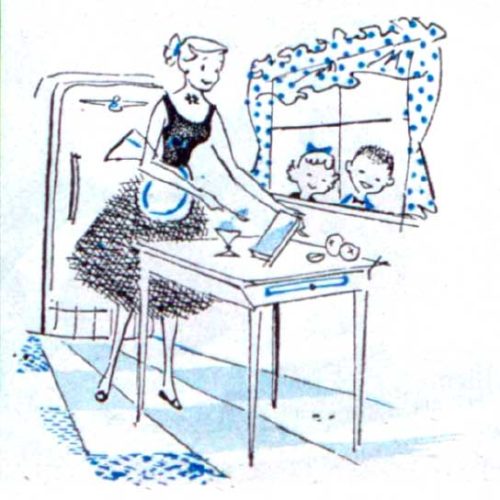Summer Road Trips: Unplugged Travel
The call of the open road is as booming as ever. As far as domestic leisure travel is concerned, more Americans are opting to go by way of the automobile. Whether it’s due to the flexibility of packing heavy and stopping at will along the way or the nostalgia of highway getaways, road trips are back! In this series, we offer destinations for the perfect American road trip.
Nowadays, the best way to recharge is to unplug. Stow away your tech devices and grab a paper map to make the most of your road trip. Here are some U.S. destinations where going off-grid is in.
Red Rock Ranch

Your cell phone won’t receive a signal at this dude ranch in the Bridger-Teton National Forest near Jackson Hole, Wyoming. With private cabins, horseback riding, fly fishing, and square dancing, an all-inclusive getaway at the western retreat is a great way to leave your worries — and e-mail notifications — behind.
Out’n’About Treesort

Stay in a real-life themed treehouse at this bed and breakfast near the Oregon-California border. Families, couples, and solo travelers can enjoy hiking in nearby Siskiyou National Forest, where waterfalls and the northernmost natural redwoods meet the Pacific coast. The “treesort” also offers a zipline tour of its grounds as well as horseback rides and river rafting.
Prabhupada’s Palace of Gold

This ornate palace was built by untrained devotees of Krishna consciousness in the 1970s in New Vrindaban, West Virginia. The history of the palace and its founders is rife with scandalous intrigue, but the community has worked to clean up its reputation in recent years and attract the spiritually curious to its cow-and-peacock-filled grounds. The palace lodge warns of a “fairly weak and sometimes unreliable” Wi-Fi signal, but guests can enjoy vegetarian dining and seasonal celebrations and retreats app-free.
Maine Windjammer Cruise

Sailing with Maine Windjammer Cruises guarantees a unique vacation aboard a completely wind-powered historic schooner around the islands of Maine. Each cruise is unpredictable since the route depends on weather and wind direction, but you’re sure to experience the surrounding harbor seals and gulls on spruce-covered islands and a signature lobster bake. The company has been taking passengers around the Maine islands since 1936. They didn’t need an iPad to do it then, and you don’t need one for it now.
Camp Wandawega

A stay at this Wisconsin camp is like travelling back in time to the summer camp of your childhood — without the rules and counselors. Like a Wes Anderson film set, Camp Wandawega is meticulously designed and furnished with vintage wares, from the canoes on Lake Wandawega to the hardcover books lining each cabin. There are plenty of activities available, like archery, volleyball, cycling, and evening campfires, and the retro feel might make you forget laptops exist.
Big Bend

Between the Big Bend National Park and Big Bend Ranch State Park in West Texas is Terlingua, a ghost town. Throughout the region are limitless opportunities for hiking, camping, and exploring the mountainous desert terrain. In Terlingua, visitors are encouraged to check out the abandoned mining town before trying the chili at Starlight Theatre. In November, the “Superbowl of chili cook-offs” takes place in Terlingua.
Hot Springs, Virginia

The first hotel was built on the site of the town’s natural hot springs in 1766. Since then, The Homestead — now The Omni Homestead Resort — has hosted 23 presidents to relax in the property’s restorative baths. Unfortunately, the Jefferson Pools — the local favorite bathhouse that Thomas Jefferson reportedly visited in 1818 — have been closed due to structural issues, but the mineral-rich, crystal clear waters are said to have been used by Native Americans for more than 9,000 years.
Cartoons: TV Time
Before we complained about everyone staring at their phones, we complained about everyone staring at the idiot box. Our talented cartoonists capture some of our favorite moments of small screen stupor.

Nov/Dec 2011
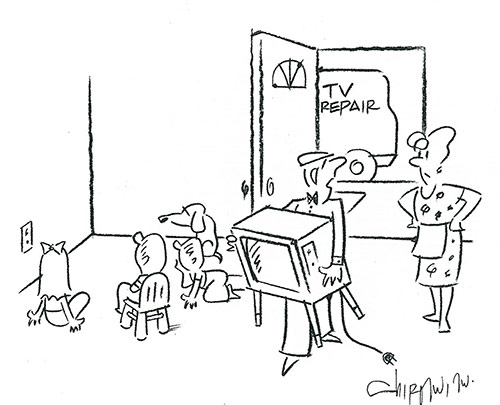
May/June 2009
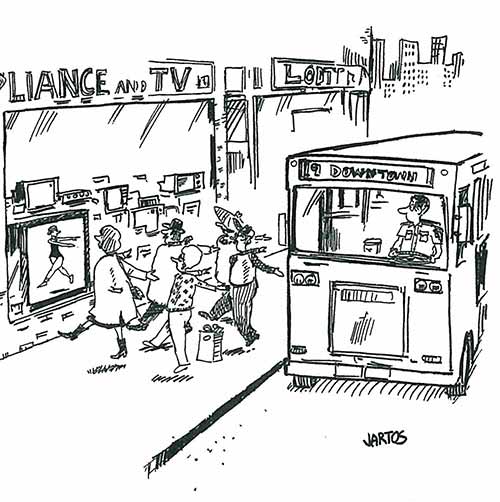

Jan/Feb 2011
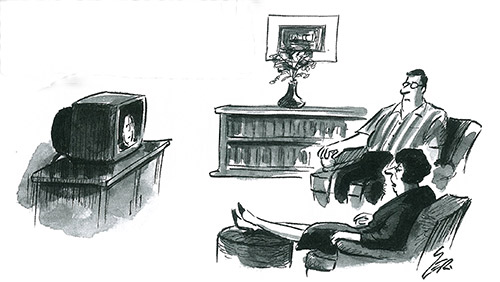
Sept/Oct 2000
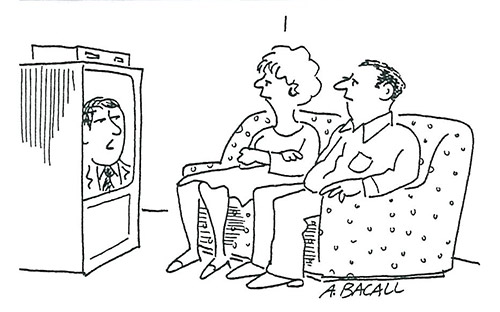
Sept/Oct 2000
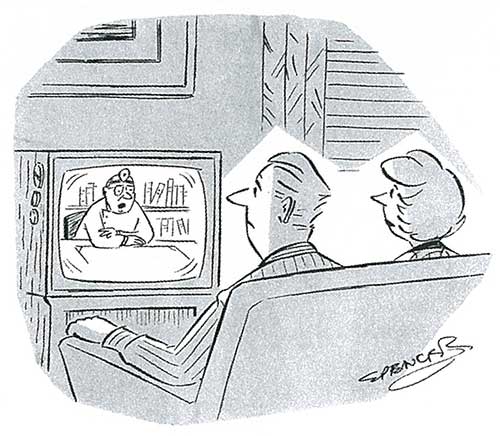
Jul/Aug 2005
You Be the Judge: Inde-fence-able Neighbors
“You Be the Judge” is a feature in The Saturday Evening Post that looks at the details of a legal case where the solution is not always clear-cut. Who’s right? You be the judge!
In 2011, Karen and George Stuck bought a home on a corner lot in Rochester, New York. After moving in, the couple made plans to build a privacy fence around their backyard. They learned that the city of Rochester permitted zero lot line fences, which meant they could put the fence directly on their property line, and they planned to take advantage of it.
Checking their property survey, they discovered that a narrow triangular strip of their neighbor’s driveway — about one-thousandth of an acre — was encroaching on their land. The Stucks informed their neighbor, Tracy Hickmott, about the encroachment and their plans to build a fence and asked her to remove the sliver of asphalt from their property. Hickmott was shocked and determined to hold her ground. She had purchased her home in 1999, and the existing driveway had been in place since the house was built in 1950.
When Hickmott refused to cooperate, George Stuck took matters into his own hands, driving spikes into the blacktop driveway to delineate the property line and make way for a six-foot-tall wooden stockade fence. In response, Hickmott parked her car at the base of her driveway to block the fence’s completion. After a three-day standoff, Stuck called the police, and Hickmott was arrested and charged with second-degree harassment. Stuck also got a restraining order against Hickmott, which allowed him ample time to erect the fence along the driveway.
In November 2012, Hickmott filed a lawsuit against the Stucks, claiming that the driveway had been in place and used by her and previous owners for so long that the disputed land had become hers under the doctrine of adverse possession. Hickmott also complained that she barely had enough room between her house and the fence to pull her car into the driveway. She asked the court for compensation for the damage to her driveway during the installation of the fence and damages for the arrest and legal fees. In addition, she requested that the Stucks move the fence far enough away from her driveway that she could open her car doors when parking next to her house.
The Stucks countersued, asking the court to dismiss Hickmott’s action, to order her to remove the encroaching portion of the driveway, to affirm their ownership of the disputed land, and to grant legal fees and damages.
The Decision
In November 2015, the New York Supreme Court granted Stuck’s motion to dismiss but ordered that Hickmott be allowed a right of continued use of the driveway as situated and that neither party impair the quiet enjoyment nor obstruct the use of the driveway or the fence. In 2016, a further court order permitted the Stucks to enter Hickmott’s property for three hours every two years for the purpose of painting their fence. Hickmott appealed. In February 2018, the court upheld the decision, ruling that common-law property rights allow property owners to access abutting properties in order to make improvements or repairs.
—Stuck v. Hickmott (2018)
This article is featured in the May/June 2018 issue of The Saturday Evening Post. Subscribe to the magazine for more art, inspiring stories, fiction, humor, and features from our archives.
North Country Girl: Chapter 54 — California Nightmares
For more about Gay Haubner’s life in the North Country, read the other chapters in her serialized memoir.
A cute guy I had met at the Consumer Electronics Show had asked me to California for the Fourth of July, and since I had no other invitations to picnics or barbeques, I accepted, hoping an all-American holiday with a regular guy would give my life some semblance of normal.
Gerry picked me up from the Orange County Airport, kissed me, and said, “It’s my day to see my daughter, okay?” A visit to a hitherto unmentioned daughter had not been part of my California dreaming. In the next five minutes I found out that Gerry had been married, had a baby, and had accidentally dropped that baby. Baby’s head hit the floor exactly on that scary soft spot, squashing her brain. When the doctor told Gerry and his wife that their daughter would never be able to feed herself or wipe her own butt, Mrs. Gerry took a powder.
I had hoped that Gerry’s plans included taking me to Malibu or the La Brea Tar Pits, but instead we drove out into the endless acreage of suburbia, finally pulling up in front of a big brick house, the kind that gets repurposed as a funeral parlor, nursing home, or rehabilitation center.

There was no waiting in the car for me. Gerry led me by the elbow inside, nodded at the white-capped receptionist, and pulled me down a blindingly bright hallway that looked sterile, but had an undertone of piss and puke and ammonia and bleach. We went through a door marked by a cut out picture of a grey kitten, and Gerry dropped my arm to swoop in and pick up his daughter.
You could say this two-year-old with her porcelain skin and Gerry’s starry blue eyes and golden brown curls was pretty, except other than the ability to hold her head up, she was as limp as a rag doll. Gerry cooed at her and kissed her and introduced me to her in baby talk.
“She’s always so happy when you come to see her, Gerry,” beamed the nurse who stood watch, I guess so that Gerry didn’t drop his daughter again. “And you’ve brought a nice new friend to meet her.”
The nice new friend smiled back at the nurse, wondering if she could spend the rest of the time in the ladies’ room and if it could possibly smell worse than the room she was currently in. I decided not to take the chance. I thought, “If this is his day with her, it must mean that the next two days are not.” I tried to reassure myself that I was still better off than if I were standing alone on the shore of Lake Michigan, straining my neck to catch a glimpse of the fireworks from Navy Pier, surrounded by decomposing fish.

Gerry finally handed his daughter back to her nurse, and chirped at me, “What do you feel like eating?” For the first time in my life I had no appetite, but I was badly in need of a drink. I had several while Gerry enjoyed a cheeseburger and gossiped about his co-workers at Sanyo, none of whom I remembered.
I also had no appetite for sex, but thought, “Let’s just get it the hell over with and see what happens in the morning.” Gerry held me and kissed me and said, “You were so wonderful with my little girl. I feel like I can really trust you.” I made as noncommittal a noise as possible.
“Would you to do something for me? Would you tie me up and hit me with a belt?”
At this point nothing shocked me. But this just sounded like too much work. “I’m so tired from my trip. Can we talk about this tomorrow?” I now had quite a number of things I did not want to think about. I wished I were back in Chicago, sweating and drinking cheap beer with Frank.
The next day, the glorious Fourth, Gerry and I did go to a backyard barbecue, hosted by a couple who seemed perfectly normal. That night we oohed and aahed at the showers of glittering fireworks, sitting on the bleachers at the local high school. Gerry bought sparklers, and the two of us twirled them about, making patterns in the air. Anyone looking at us would think, “What a nice young couple.” That night, Gerry’s request took on a plaintive quality, like a kid asking for a lollipop. “Maybe you could scratch me, like just enough to leave a mark? If I bought you some black boots and red nail polish…”
I said, “I can’t Gerry,” went to sleep on the couch, and took a cab the next morning to the airport.
All the way back I banged my head on the airplane window, as if I could physically dislodge the memories of the past two days, finally settling on the minor consolation that since it was the Fourth of July holiday, this bizarre excursion had not cost me any modeling bookings.
Not that there was any work. There are no trade shows or conventions booked in Chicago when the temperature is a constant, daylong 95 degrees and the humidity is like a wet towel in your face. Ad agencies emptied out, and everyone took off on vacation to the cool greenery of Mackinaw Island or Door County. It was too awful outside for me to make my rounds of photographers. Showing up lank-haired, with running mascara and dark stains under my armpits would not get me cast in catalogs or commercials. I sat in Ann Geddes’ air-conditioned office and wailed.
“It’s like this every summer,” shrugged Ann. “After Labor Day, you’ll see, it will pick up again. Oh, Silver and I are going to Lake Geneva for the next two weeks.”
But last summer I had been living with James, who paid for the rent and the utilities and our once-a-week meal.
“ I need to work,” I said. “Isn’t there anyone who’s open, who’s hiring models?”
“There’s always Playboy,” said Silver. Ann gave him one look and gave me another.
Playboy was the great colossus that loomed over every Chicago model. On the one hand, Playboy was made of money: if they even agreed to look at your topless photos you were paid $500. Make it all the way to Playmate of the Month and you got a check for $25,000, which was more money than I could imagine. On the other hand, according to every model I knew, if you appeared in Playboy, even as a fully dressed background blur gazing adoringly at The Kind Of Man Who Reads Playboy while he gazed adoringly at his martini, you would never, ever again work for Ogilvy or Marshall Fields or Spiegel or Sears or any other client that valued their reputation.
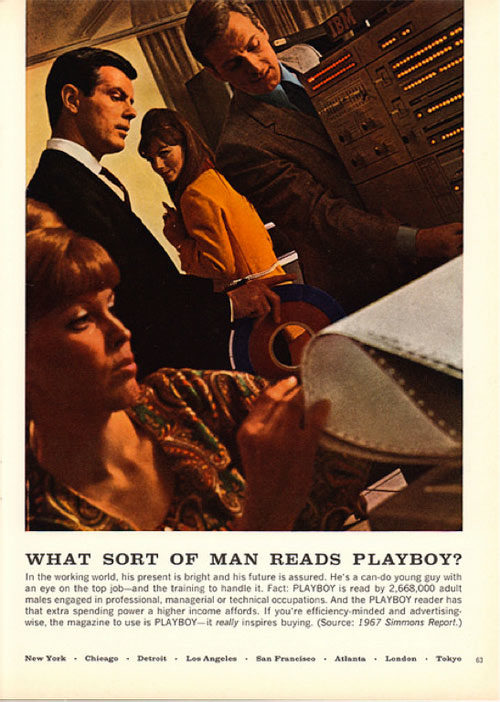
“’Cause there is something,” Silver went on. Playboy needed models for an orgy scene. A lot of models. “No one will be able to pick you out. They’ll pay $200 an hour, and with that many people it will take hours to shoot.”
Ann sighed and said, “It’s up to you, Gay.” I swallowed hard, thought of the tiny amount remaining in my checking account, and told Ann I would do it, I would risk my career, a long shot to begin with, and pose for the photo illustrating Dan Greenburg’s article, “My First Orgy,” a photo that also ended up on the cover of the September issue cut into the shape of a bunny head.
The Playboy building featured turbo-powered air conditioning, which felt delightful on the steaming hot day when I pushed the heavy brass revolving door into the lobby; the AC immediately whisked away the Chicago sweat. But it was arctic awful up in their huge photo studio where I stripped to down to nothing along with 29 other good-looking young people, at a five-to-one female to male ratio. I was grateful I didn’t recognize any of them, and no introductions were offered. We anonymous naked people were sent over to a vast stretch of black vinyl that had been pegged down on the floor. A funny bald man took over, running around us, arranging and re-arranging our nude bodies, while consulting a sheet of paper he held in his hand. “No, that won’t work,” he finally said. “Everybody stand up. We have to start over.”
I held my halter dress in front of my chest, wandered up to the bald guy in charge of the shoot, and peeked over his shoulder at a rough sketch of impossibly closely entwined bodies.
“You should arrange us so that we look like a bowl of fruit, a reverse Arcimboldo,” I said. He looked up at me. “I’m George, the art director. Do you smoke pot?”
“If I don’t have to do it naked,” I said, and slipped my dress over my head. George called a break and we snuck into a darkroom, along with the photographer and his assistant. It was very spacy pot, and made the rest of the day almost pleasant for me, as it took George hours to work our bodies into the right configuration. Silver was right: I ended the day $800 richer (minus Geddes’ ten percent).
George caught me as I was leaving. “Do you want to come to a party at my place tonight? You can wear clothes.” George scribbled his address on a piece of paper. It was 155 Burton Place. I lived at 40 Burton Place.

One-fifty-five Burton Place was hidden behind a pebbled wall studded with shards of multicolored tiles. An archway held an ornate black wrought iron gate, which was left ajar. I walked into yet another Wonderland, a Gaudi-inspired habitat, the two-story buildings stuccoed white and red-shingled, with ornate mosaics and stained glass windows. The apartments looked like mushrooms that had just sprung up around the cobblestone courtyard. There wasn’t a square edge in the place. Staircases curled around turrets and the dark wood doors were rounded at the top, with heavy medieval knockers. If Bilbo Baggins had owned a city pied-a-terre, it would have looked like a Burton Place apartment.
It was easy to find the door with the brass numeral 1. Boz Skaggs was blasting forth too loudly for a knock to be heard, so I let myself into a large living room, low-ceilinged with dark wooden beams, nubby orange sofas and ottomans, and dim lighting. Men and women were scattered about, no one over 35, everyone was drinking and smoking something.
George materialized. “It’s Gay, right?” I did have my stupid name necklace on as a reminder.
“Stick out your tongue.” George placed a small, gritty pill in my mouth and said, “It’s MDA — kind of like acid,” which was fine with me. Like Alice with her iced cake, I swallowed it.
Even with her clothes on, I recognized another model from that afternoon’s fake orgy and headed over to make modeling small talk. My way was blocked by a man with too much nose and not enough hair, wearing a pink bowling shirt with “Carl” stitched on the pocket, and the kind of black and metal eyeglasses the nerdy math boys in high school clung to after everyone else had moved on to wire rims. “I’m Michael Trossman, artist and resident wit. And you are…?”
Michael was an illustrator and lived in one of those Hobbit-like apartments. He backed me into a corner and held me captive there. He was cracking wise, keeping me amused, and then the drugs kicked in. “Wow,” I said. Michael grinned. “Don’t drink too much. I’ll get you a beer.”
Before my brain left the building, I made myself promise that I would not sleep with anyone at this party, despite the erotic feeling of oneness and love I suddenly had for all of them. It was Love Potion No. 9; I would have kissed a cop. A look around the room proved that everyone was feeling the same chemical bliss; couples were dancing, gazing into each other’s eyes, stroking faces and hair, preludes to a kiss and more. It was a real life version of the fake orgy I had been in that afternoon.
Michael, the guy closest to me — actually a little too close — was not my type: those glasses, that nose, his hairline in full retreat. But the psychic tendrils of MDA wove their way from him toward me, disturbing the air. Then through the fog of drugs and the buzz of sexual arousal, up popped the memory of Gerry begging me to hit him, and my libido shriveled up and ran away.
Michael picked up on this shutting of the bedroom door that the MDA had cracked open. He downed his beer and took a small step away from me.
“So you know George?” he asked. I nodded. I guess I knew George, having spent the day naked with him.
“He’s a great art director. The people who live here are artists and designers,” Michael said, and pointed out some of the other Burton Place residents: Ronny was a skinny French guy with long side-swept bangs, a photographer. There with his cute blonde girlfriend. Fred, a relocated California surfer, was an air-brush illustrator who had more work than he knew what to do with and a smiley, brown-haired wife who looked even more corn-fed Midwestern than I did. An older woman, the only person who was not out of her mind on drugs, was the architect’s daughter; she lived in the biggest, most Art Nouveau apartment. “It’s amazing,” said Michael. “She doesn’t invite too many people up, but if you like, I can get you in to see it. I did a charcoal drawing of her father; it’s hanging above the fireplace.”
I did not want to be alone someplace with Michael, nor did I want to commit to a future date. “Um, sure, yeah, that would be great,” I murmured, and changed the conversation.
Michael was 29, smart and funny, quick-witted, had read most of the books I had, had seen a whole bunch more movies, and could do dead-on impersonations. As the drug streamed through us, Michael fell into confessional mode. The folks of Burton Place had been throwing these MDA parties for months. Under the drug’s woozy influence, Michael had fallen in love and slept with Ronny’s girlfriend. When she broke it off, Michael fell in love and slept with Fred’s wife. He felt terrible about it — Fred and he were friends — and was trying to end the affair. “Look at her. Isn’t she beautiful?” Michael sighed, gazing at his beloved who was sitting on her husband’s lap. She had clear skin and shiny hair, I gave her that.
Now that I had gone from potential bedmate to good listener, Michael babbled on. His first and truest love was his ex-wife, an actress and comedian at Second City, whom he had knocked up while he was still a student at the Art Institute. Her ogre Irish parents demanded that Michael — even though he was that devil’s spawn, a Jew — make a daycent woman out of her and shot-gunned him to the altar. His son was born, and then another son (those crazy Catholics, I thought), who he loved more than anything on earth. “Then she divorced me,” sighed Michael, which threw the final wet blanket on any tiny glowing ash I may have felt for him.
Loose lips sink ships and they drive girls to put down their beer and stumble home alone on a night that was lit up by rainbows and stars and meteors, the drugs still coursing hot in my veins and clouding my mind. I might have been okay with the incestuous goings-on at Burton Place, but the divorce and the two kids were too much. The sidewalk wobbled beneath me as I walked the three blocks to my own front door, and a bed I shared only with my little dog Groucho, who seemed oblivious to the fact that the room was swirling about us.
Vintage Ads: American Advertisers Take on Hitler
As the United States began to realize the significant threat of Adolf Hitler and his Nazi party to Europe and the world, the importance of the need to defeat him grew. This urgency was reflected in the advertisements of the era, whether they were appealing to fear of the Nazis, pride in American troops, or bravery in the face of danger.
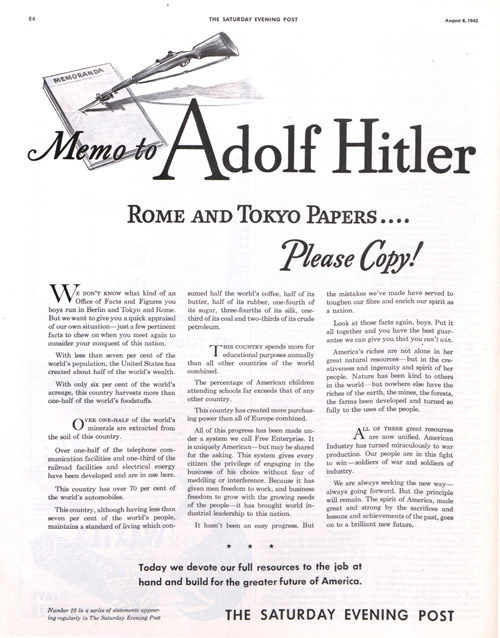
Memo to Adolf Hitler
August 8, 1942
(Click to Enlarge)
“The spirit of America, made great and strong by the sacrifices and lessons and achievements of the past, goes on to a brilliant new future.”
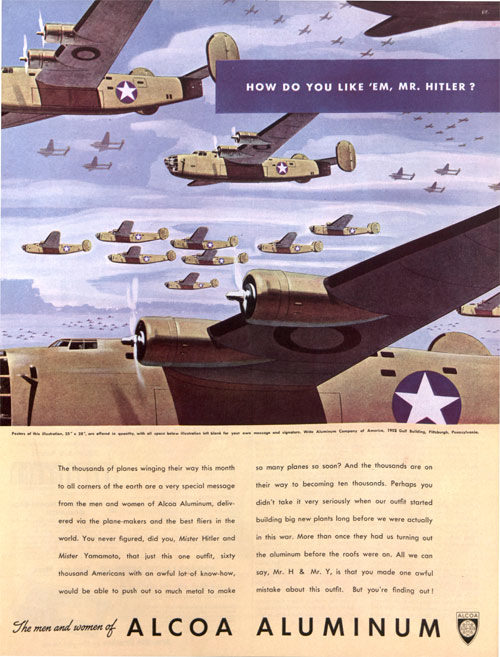
How Do You Like ‘em, Mr. Hitler?
August 15, 1942
(Click to Enlarge)
“You never figured, did you, Mister Hitler and Mister Yamamoto, that just this one outfit, sixty thousand Americans with an awful lot of know-how, would be able to push out so much metal to make so many planes so soon?”
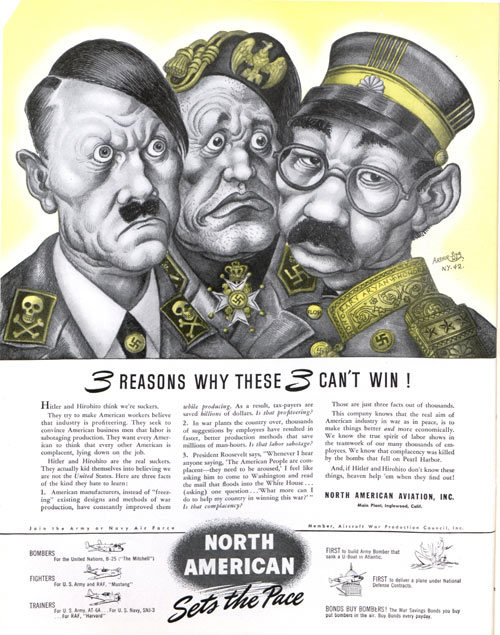
3 Reasons Why These 3 Can’t Win!
August 29, 1942
(Click to Enlarge)
“Hitler and Hirohito are the real suckers. They actually kid themselves into believing we are not the United States. Here are three facts of the kind they hate to learn.”
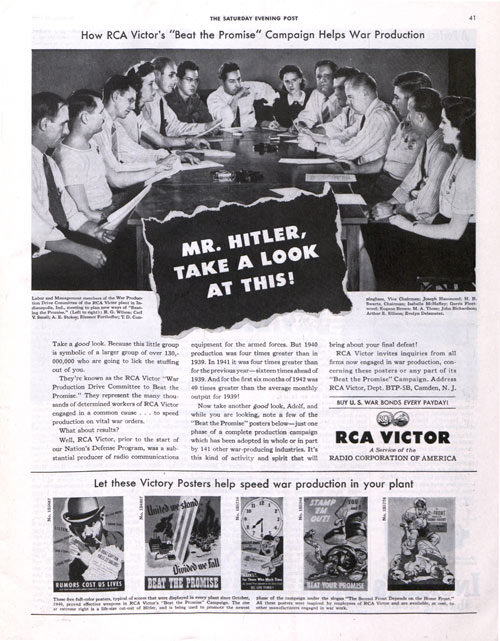
Mr. Hitler, Take a Look at This!
November 28, 1942
(Click to Enlarge)
“Take a good look. Because this little group is symbolic of a larger group of over 130,000,000 who are going to lick the stuffing out of you.”
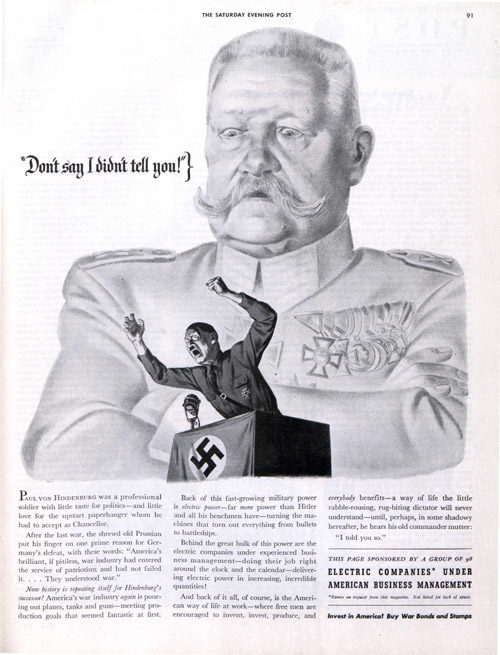
Don’t Say I Didn’t Tell You!
January 23, 1943
(Click to Enlarge)
“And back of it all, of course, is the American way of life at work—where free men are encouraged to invent, invest, produce, and everybody benefits—a way of life the little rabble-rousing, rug-biting dictator will never understand—until, perhaps, in some shadowy hereafter, he hears his old commander mutter: “I told you so.””
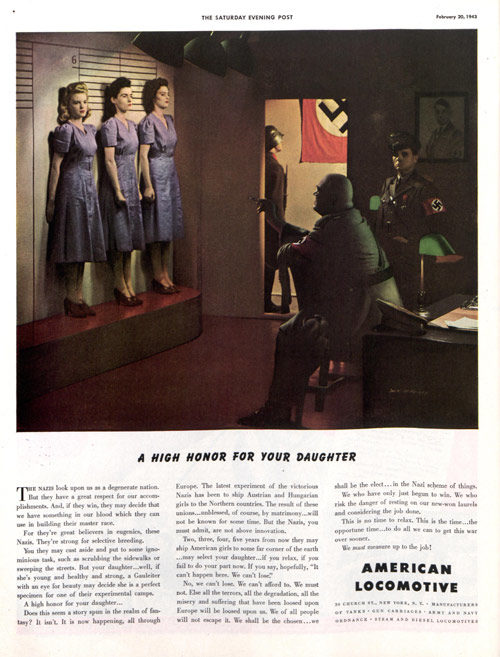
A High Honor for Your Daughter
February 20, 1943
(Click to Enlarge)
“You they may cast aside and put to some ignominious task, such as scrubbing the sidewalks or sweeping the streets. But your daughter…well, if she’s young and healthy and strong, a Gauleiter with an eye for beauty may decide she is a perfect specimen for one of their experimental camps.”
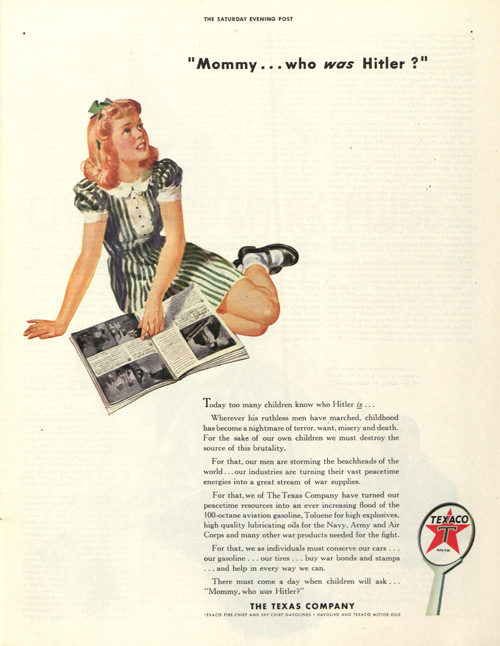
Mommy…who was Hitler?
February 20, 1943
(Click to Enlarge)
“We as individuals must conserve our cars . . .our gasoline . . . our tires . . . buy war bonds and stamps. . . and help in every way we can. There must come a day when children will ask . . .”Mommy, who was Hitler?”
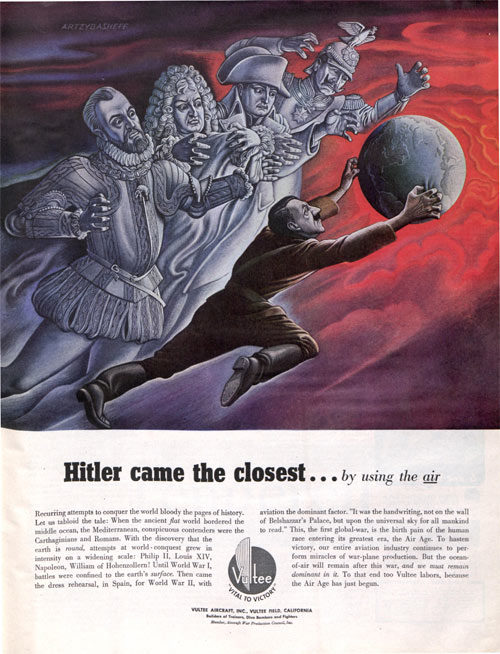
Hitler Came the Closest…by Using the Air
March 6, 1943
(Click to Enlarge)
“This, the first global-war, is the birth pain of the human race entering its greatest era, the Air Age. To hasten victory, our entire aviation industry continues to perform miracles of war-plane production. But the ocean-of-air will remain after this war, and we must remain dominant in it. To that end too Vultee labors, because the Air Age has just begun.”
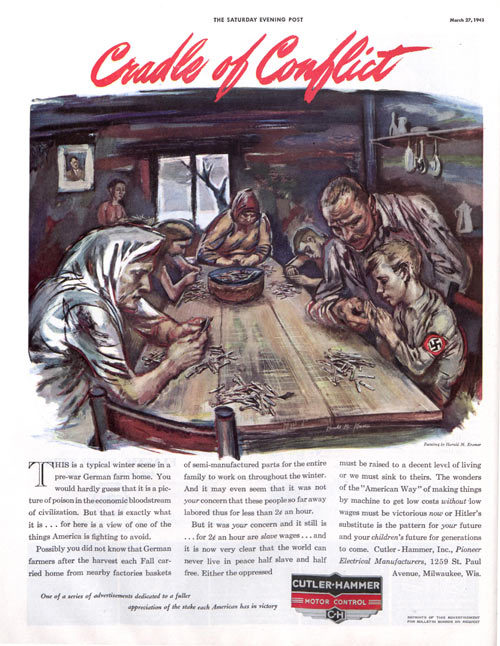
Cradle of Conflict
March 27, 1943
(Click to Enlarge)
“Either the oppressed must be raised to a decent level of living or we must sink to theirs. The wonders of the “American Way” of making things by machine to get low costs without low wages must be victorious now or Hitler’s substitute is the pattern for your future and your children’s future for generations to come.”
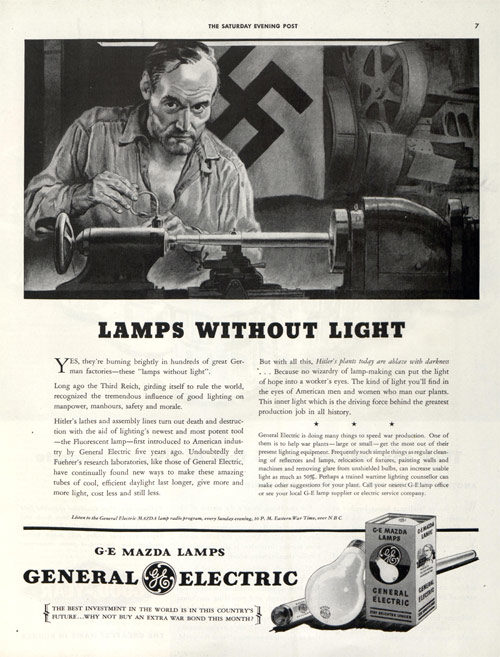
Lamps without Light
July 17, 1943
(Click to Enlarge)
“Hitler’s plants today are ablaze with darkness…Because no wizardry of lamp-making can put the light of hope into a worker’s eyes. The kind of light you’ll find in the eyes of American men and women who man our plants. This inner light which is the driving force behind the greatest production job in all history.”
Logophile Language Puzzler: Dumpster Diving
1. Oscar hid in a dumpster for three hours in his failed attempt to ______ police.
- allude
- elude
- illude
2. Erin is an avid taphophile. Practically every weekend, you can find her at
- an airport.
- a candy store
- a cemetery.
3. Ramona likes cameras but not Polaroids, appreciates manners but not etiquette, and enjoys being amorous but not romantic. What does Ramona like?
Answers and Explanations
1. b. elude
To elude means to evade or escape. Notice how all three words start with e? Keeping that in mind can help you remember what this word means.
To allude means to call something to mind without explicitly mentioning it — in other words, to make an allusion. For example, when someone refers to a holiday naysayer as a “Scrooge,” they are alluding to Charles Dickens’ A Christmas Carol and its main character, Ebenezer Scrooge.
Illude, the least commonly used of this trio, is a verb that coincides with illusion. When you illude someone, you subject them to an illusion, usually for the purposes of deceit. Oscar might try to illude the police in order to elude them, but it’d be pretty hard to do from inside a dumpster.
2. c. a cemetery.
A taphophile is someone who enjoys tombstones and crypts. The word stems from the Greek roots taphos “tomb” and philos “friendly, loving.” You’ll find the taph root in the more common words cenotaph and epitaph (which literally means “on the tomb”). And the phile root shows up all over the place, from Philadelphia (The City of Brotherly Love) to the philharmonic (“love of harmony”) orchestra to, ahem, logophile (“word-lover”).
3. Ramona likes words that have no ascenders or descenders.
An ascender is a stroke (line) in a letter that rises above the midline, also called the x-height — the imaginary line that marks the top of most lowercase letters. The letters with ascenders are b, d, f, h, k, l, and t.
A descender is a stroke in a letter that dips below the baseline — the imaginary line a letter “sits on.” The letters with descenders are g, j, p, q, and y.
Ramona likes cameras, manners, and being amorous, all words that have neither ascenders nor descenders.
Many words in the English language use only letters with no ascenders or descenders because half the letters, including all the main vowels, fit the bill: a, c, e, i, m, n, o, r, s, u, v, w, x, and z. From this collection you can spell the words cream, curvaceous, erroneous, nervous, worsen, both men and women, and many others.
Bonus: The dot above the lowercase i and j is called a tittle.
“Anything Once” by Nina Wilcox Putnam
Nina Wilcox Putnam wrote lighthearted comedy, gothic horror, romance, and western novels and short stories (in addition to her journalism) throughout the early 20th century. Putnam wrote the story that was adapted into The Mummy starring Boris Karloff, and she even drafted the first 1040 packet for the Bureau of Internal Revenue in 1914. Her 1919 story “Anything Once” follows a female film star and her mother on vacation in Atlantic City, where their class anxiety and self-delusion cause situational comedy amongst wartime tension. Rife with East Coast-showgirl dialect and occasional pathos, Putnam’s story showcases the transitional time of 1919 with a lively sense of culture and character.
CONTENT WARNING: racial slurs
Ain’t it funny the things that comes into a person’s head when they are rubbing cold cream onto their nose? All sorts of stuff, some of it good sense and some of it the bunk. But most of it pretty near O.K. If someone was to take down the ideas I get at such a sacred hour I’d be out of the dancing game and into the highbrow class just as quick as the printer got through his work.
It sure is a time when a woman’s true thoughts come to the surface along with the dust and last night’s make-up, and many a big resolve has been made owing to that cleanly habit. Wasn’t there some wise bird made up a quotation about cleanliness being next to goodness knows what? Well, believe you me, it’s the truth, for once a woman starts in with the cold cream all alone — and she sure does it at no other time — there is no telling what will come of it beside a clean pink face.
With me personally myself, that’s where most of my ideas about life come from — right out of the cold cream tube! And while indulging in this well-known womanly occupation the other evening I commenced thinking about rest and how important it is for us Americans — and of the way we go after it — like it was something we had to catch and catch quick or it would get away from us. Do you get me? If not leave me tell you what a friend of mine which has just been mustard out of the service says to me when I was checking up his experiences abroad while he was checking up what the waiter had put down.
“My idea of rest?” he says. “Why taking Belleau Wood after three restless weeks in the trenches,” he says.
Which sort of puts the nut in the shell, as the saying is. And also at the same time reminds me of the rest I just recently took.
Not that I generally need one any more than any other thoroughly successful star, for heaven knows the best-known parlor dancing act in the world and Broadway, which mine undoubtedly is, don’t need to rest because the managers theirselves always come after me, and resting I leave to the booking-agency hounds. But this time it was bonea fido, and come about in a sort of peculiar way.
To commence at the start it begun with me falling for the movies, which goodness knows I only done it for the money, there being no art in it, and they having hounded me into them for a special fillum. And of course many well-known girls like Mary Garden and Nazimova go into pictures, and even myself, but it’s simply because of being hounded, as I say. But once in you earn your money, believe you me, and I have stood round waiting for the sun like Moses, or whoever it was, until my feet nearly froze to the Palisades before jumping off; only of course it was a dummy they threw after I had made the original motions of the leap to death.
And the worst part is once you are signed up on one of these “payment to be made whether the party of the first part” — that’s me — “is working or not” you got to do like they say, and a whole lot of the “not working” means plain standing round waiting for the director or the camera man or the rain to quit, and what us public favorites suffers when on the job is enough to make the photographer’s Favorite of Granger, Wyoming, abandon the career she might of had in favor of domestic service or something like that where she’d get a little time to herself.
Well anyways my judgment having slipped to the extent of having signed my sense of humor away for six months at twenty-two hundred a week I was in the very middle of a fillum called the Bridge to Berlin when one day, just as a big brute of a German officer by the name of O’Flarety had me by the throat in a French chateau, the studio manager comes in and says the armistice is signed and the war is over, and we was to quit as who would releaze a war fillum now and we was to start on something entirely different, only he didn’t know what the hell it was to be and here was eight thousand feet wasted. And believe you me I was sore myself, for we had shot that strangling scene six times by then and my marcelle wave was completely ruined by it, and I would of liked to of had something to show for it.
But anyways orders was to quit and so me and ma and the two fool dogs and Musette left the wilds of Jersey and after a stormy voyage across the Hudson come safely home to our modest little apartment on the Drive, there not to work at twenty-two hundred a week until Goldringer got the studio manager to get the scenario editor to get me a new story, which at the price was not of long duration, for while they don’t care how long a person stands round waiting to be shot they just naturally hate to pay you for doing the same thing at home in comfort.
Well anyways the bunk that scenario editor picked out was something fierce. I wouldn’t of been screened dead in it. But it just happened I had a idea for a scenario myself, which come about through somebody having give me a book for Christmas, and one night, the boy having forgot to bring the papers, I read it. And was it a cute book? It was! I had a real good cry over it, and while it wasn’t exactly a book for a dancer I could see that there was good stuff in it. So finally me and ma stopped into Goldringer’s office after he had twice telephoned for me and handed him a little surprise along with the volume.
“I got a idea for a picture, Al,” I says, “and here’s the book of it.”
“Well, Miss LaTour, what’s the name of it and idea?” says he, chewing on his cigar strong and not even looking at the book but throwing it to the stenographer, which is a general rule always in the picture’ game and one reason we don’t see such a crowd of swell fillums.
“The name is Oliver Twist,” I says. “It’s a juvinile lead the way it stands, but I want it changed a little, with me as Olivette Twist — the editor can fix it so’s that will be all right. It’s really a swell part. I could wear boy’s clothes some of the time.”
“Huh! Olivette Twist,” says Goldringer, taking back the book and looking at the cover of it. “Always thought it was a breakfast food! But if you say it’s O.K. we’d better get it. Where is this feller Dickens? We’ll wire him for the rights. Friend of yours?”
You see if anybody brings scenarios personally, a star in particular, it’s generally a friend’s.
“No,” I says. “It was sent me by Jim along with a letter which shows the bird is well known,” I says, “and is in Westminster Abbey, London, England, which Jim says proves his class.”
“Must be a swell apartment,” says Goldringer. “All right, we’ll send a cable to him and see if the picture rights is gone or not. If the boy is so well known he may stick out for a big price. This is Thursday. We may hear from him by Monday or Tuesday, and we’ll get a scenario ready anyways so’s we can begin to shoot not later than a week from today. Until then,” he says, “run along and amuse yourself and don’t do anything I wouldn’t.”
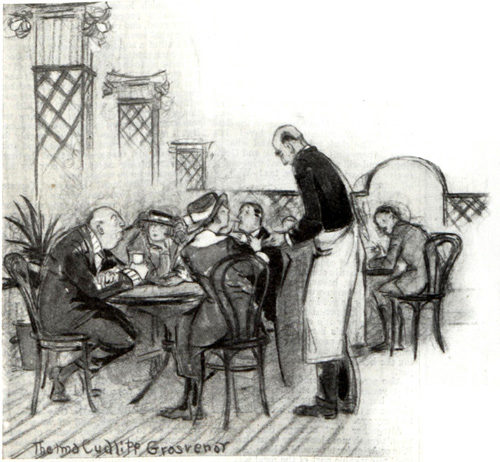
Well, me and ma was shown out then, and down on Broadway ma seen some saltwater taffy in a drug store and wanted to go in and buy it, which I had to prevent because outside of ma being in no need of nourishment she weighing considerable over the heavyweight requirements already and if she was to have went back into the circus it would no longer be on the trapeeze, and a certain party in the sideshow would have a strong competitor for her job and it wouldn’t be the human skeleton either. But leaving off these considerations how would it look for us to go up the avenue in my new wine-colored limousine — which I earned myself and no one can say different with truth — and eating stuff like that out of a folded paper box?
Ma certainly has my health well in hand and heart, and it’s seldom we quarrel over any little thing, but she certainly has no class instinct, or instinct for class — do you get me? And when I try to make her see that them little refinements is what makes me the big success I am she sometimes kicks, and if it’s hunger it’s got to be met immediately; if not one way — why, then another. So in lieu, as the poet says, of the taffy, I had to take her to the Ritz and watch her put away six vanilla eclairs at two bits each, and a quart of cocoa; not that I begrudge the money, only believe you me the way all hotels charges nowadays is rapidly making Bolsheviki out of even we capitalists. Do you get me? You do! But of course in my line you got to keep before the public in the right way.
Well anyways ma complained over the loss of that taffy the whole way through the six eclairs, which it was certainly a little hard on me to have to sit there and watch her while for professional reasons eating only one of these tomato surprises which never surprise but the once, on my figure’s account, and certainly it’s a fact that the two of us was doing the next best thing to what we wanted instead of the thing itself, which is one of the prices of success. So, as is also often the case at such times, I was a little mean to ma on account of having been mean already — do you get me?
“Mamma,” I says, “you certainly are getting heavier. It’s a crime for you to wear these narrow skirts!”
Ma give me a searching look the same as used to lead up to castor oil when I was a kid, and then took the half of a eclair at one bite before replying.
“Now, Mary Gilligan, you needn’t take out your artistic temperament or any other ailment on me!” she says as firmly as the eclair would permit. “Just because Jim is in France yet, sand your moleskin dolman was a failure and you ain’t been occupied daily for a week or more, and slipped up on doing your setting-up exercises this morning, which I wouldn’t of mentioned only you started it,” she says. “It’s no excuse for picking on me,” she says. “What if I am a little plump? Ain’t I earned the right to be? What with three kids and your pa to bring up, and on the center trapeeze in the circus right through it all except when absolutely necessary? You don’t know what a woman can go through!”
“Don’t I, just!” I snapped; for ain’t it the truth every woman has the very worst troubles that any woman ever had? And she sure gets sore when another woman sets up to go them one better!
“No you don’t!” retorts ma with that maddening air of being older than me which she uses to squelch me every time she can’t get me any other way. “No you don’t!” she says. “You never brought up three kids without a nurse girl while on the trapeeze; you never brought up a thing but two fool dogs, and you even leave them to the carelessness of a personal maid,” she says. “Poor dears, goodness knows what will become of their little canine minds and morals.”
“Now ma!” I begged, because she oughter know that is a sore point with me, and she had me on the raw.
“Well then!” she says. “You got a swell job and no troubles only maybe a sluggish liver, and you ain’t the only woman in America which General Pershing can’t yet spare the husband of,” she says. “And maybe I do need to reduce a little.” Which was her way of apologizing.
And just as this lull occurred who should come into sight but Maison Rosabelle, her which runs the shop where myself and all the most chic professionals get their clothes. She was all dressed up like a plush horse with real sables, part of which must of come off them simple refined little gowns I had made for the Bridge to Berlin that was ruined by the armistice. Her hair had just been rehennered and her face was as fresh as a tea rose straight from the fragrant facial massage. She smiled and sailed down on the two of us, which we welcomed with the usual relief of a family quarreling when neither sees the way to win out and have got to go on living together. In other words she automatically buried the hatchet for us, as the schoolbooks say.
“So pleased to of run into you, dearies!” she says. “For I’m goin’ to Atlantic City tomorrow for a little rest.”
No sooner was them words out from between her lip rouge than I see a vision of saltwater taffy arising in ma’s eyes. Believe you me, ma is certainly hard to pry loose from anything she has once set her mind on! And Maison had to continue in that cordial manner.
“Why don’t you run down for a few days?” she says. “It’ll do you good. You’re looking kinda pulled down, Mrs. Gilligan!” she says. And of course ma fell for that.
“I do feel a little low,” she says, finishing off her cocoa. “And Mary — Marie here — is waiting until they get a answer to a cable which was sent to England by the studio. I understand we may have quite a wait, so I really believe we might go along.”
Now as I looked at ma it come over me that maybe she had the right dope. When people that live together, especially if not friends but relations, commence to get a little on each other’s nerves, going away on a trip is good for what ails them. The only trouble is that in the case of females they generally go together. Still, with the whole bunch of new and different stuff it gives them to fight over — railroad tickets, and who wired for these horrid rooms, and I told you to bring a heavier coat, and etc. — they generally get straightened out quite a lot. Even the idea of going along with Maison didn’t worry me then, I having been on tower many a time when the Number One Company went out, and ma the same for years, and we generally speak, even to the publicity man, no matter if we have made Rochester, Buffalo and Chicago in a quick jump, playing matinees as well.
So I am without the wholesome and well-founded fear of taking a pleasure trip with friends which is the bitter fruit of most persons’ experience of the same. Besides, I sort of like Maison, which of course her real name is Masie Brady, and her funny little husband, which is also still in France, she not being dependent any more than myself nor would she hold him back from serving his country only I don’t hardly believe she urged him to go for quite the patriotic reasons I did, he having been a traveling man and so when he retired on her income she didn’t feel as natural and affectionate and homelike and all that as when he was away most of the time. But at any rate I and she were both war widows and old friends from the time her mother was lady lion tamer and mine on the trapeeze, and so in spite of the bills she charges me she has more refinement than most people and so I says all right, we’ll go to Atlantic City and we’ll be on the one-twenty train tomorrow.
“That’s sweet, dearie!” says Maison. “We’ll get a swell rest!”
Then she set sail, and was off with a gentleman friend, which had been waiting at the entrance all this time with a gardenia in his buttonhole. And ma and me called for the check and dogs and limousine and hitched our way homeward through the traffic to our quiet little apartment with seven windows and a beautiful outlook of the river and the railroad tracks and etc.
Then while Musette packed only three trunks and my gold-fitted dressing case and a couple of hat boxes and my specially designed jewelry box and the traveling hamper for the dogs, we having decided to travel light and probably not stay over three or four days, ma went into the all-tiled kitchen and commenced getting up a little snack of cold beef and potato salad and fried-cheese sandwiches and coffee and a few hot biscuits and honey so’s we wouldn’t have to go out and eat, which ma certainly loves to do, and no cook ever stands it for more than a week and the current cook’s week was up that morning before we went downtown.
Well anyway while she was doing this I went into the drawing-room, which is all fitted up in handsome gold furniture — that the dealer said was one of the Louis periods. Louis Cohen, I guess; I never remember quite. And I put a record on the phonograph in the case I had especially built in the same style at fifty dollars extra and all the installments paid, and streached out as good as I could manage to on the chaise lounge, which is a sort of house-broken steamer chair, and while John McCormick’s own voice sang My Little Gray Home in the West to me in the privacy of my own home I thought dreamingly about Jim and how much I was missing him and how swell we danced together and how kind and loving and brave he was and how refined, and believe me he’s about the only theatrical male that don’t murder a dress suit, and how horrible it was to be seperated from him after being married only two weeks and what fools we was to have danced together in every first class theater in America and only got married so recent, for if only we’d been married sooner maybe the pain of seperation wouldn’t of been so great by now, who knows?
And believe you me it was some pain, and I had myself crying before I knew it. For I sure am stuck on that poor simp and my only war work ain’t been done on the screen, when I give him up to whatever the Allies was fighting for, which if it don’t turn out to be as represented, believe you me, myself and a whole lot of other girls is going to want to know why!
Well anyways before ma had the biscuits baked and I had run Jada Jada and Sing Me to Sleep I was wild to get away to the pure country ocean air and some healthy outdoor exercise which would help me forget my loneliness. And a lot of quiet and rest and sleep, with the ocean pounding me to the pillow and all that.
I had only a sort of twenty-minute small-time sketch of a idea of what Atlantic City was like on account of me having been there for openings only and getting in at four-forty-five with the show beginning at eight-fifteen and the wash-up you need after the trip and ma always insisting on me doing a twenty-minute practice in my room and underwear before every opening, which is perfectly correct and one of the principal things which has made my handsprings what they are, and getting dinner far enough in advance to do the handsprings in time.
So I knew little or nothing of what Jim calls the Coney Island that went to finishing school except that there is swimming and horseback riding and a boardwalk that anyone without French heels to catch in the cracks can have a elegant walk on. What little sniff of air I had outside the theater and my bedroom at the hotel give me a appatite for more, which up to now I never had the opportunity to get because of always being with a high-class show that went right back to New York Sunday to open on Broadway. But now I was going like a regular Amercan lady citizen to rest and get full of health and do as the regular resorters did. And I was glad. I was so anxious to keep myself in a pure atmosphere for Jim’s sake, and the studio wasn’t exactly the farm — do you get me? You do! And a rest in the country was the very thing. I got quite excited thinking about it; dried my tears, stopped the phonograph and made sure that Musette put in my riding suit, bathing ditto and walking boots. And when this was done I felt better already as the saying is, and fully able to take some of the nourishment ma had got up.
The minute we set down to the table I see that she had also been making good resolutions, and waited till she got ready to confess. It come after the seventh tea biscuit and honey. On her part, I mean, I only taking cold meat and salad and things I don’t like much, for reasons before stated.
“Mary Gilligan I —” she says. “I believe I’m getting heavier,” she says, just as if it occurred to her for the first time. “And I have decided that while I am away to Atlantic City I won’t eat to amount to anything and reduce in other ways the whole time I’m there!”
“You don’t say!” I says, without batting an eye. “Do you really think you need to?”
“I do!” she says.” This is my last real meal. And you needn’t try to persuade me out of it.”
I didn’t. And next morning right after breakfast we caught the one-twenty, bags, dogs, Musette and all, and met up with Maison Rosabelle, which was dressed in a simple little trotter costume of chiffon and ermine which looked like it had been made in Babylon. I mean B.C., not L.I. And with her was a little surprise in the way of the same gentleman, Mr. Freddy Mayer, with another gardenia on him and a fine line of plausible explanations,
“Ain’t it a co-c — strange, Freddy just happens to be going our way!” cooed Maisie with all the innocence of a New York livery-stable pigeon.
“Yes, I’m taking a special offering of champagne to a special friend in the hotel business there,” says Mr. Freddy. “And with three such beautiful lady companions it’s no hardship to leave Manhattan behind, nor the Bronx,” says he gayly. “Though when we come back we may find the aldermen has decided to change both names after July first,” says the humorous dog.
“Will you please kindly open this window a little?” I interrupted him. “The air in here ain’t so good as it was.” I don’t know did this get over, but believe you me I didn’t care for that well washed young wine seller at all, nor for his company. And it was a relief when he done as I asked and him and Maison found their seats was at the other end of the car. In a way I can understand her liking traveling men but not up to the point of traveling with one, even by semi-accident. And so opening the Motion Picture World to look at the double-page spread of myself, “who has at length been lured by the artistic possibilities of the picture world,” and keeping a eye on ma to see would she stop the candy boy, I settled down to the soothing sound of Maison’s laugh, and begun my quiet little trip to healthland.
There is a large variety of ladies which have husbands still in the Army, but believe you me they certainly got one thing in common, or else no looks at all. And that is the temptation to take up with other company to some degree. Because of course while the war was holding the stage a husband’s absence could be stood, but what with this peace-hyphen in the fighting and everything, you can’t help but commence wondering what kind of a girl is detaining him over there and feel inclined to have a understudy kind of waiting off stage in self-defense. For believe you me, there seems to be something sort of attractive about a war widow, and the ones which ignores the fact and minds their own affairs is the real patriotic women of America.
Not that I want to say a word about Maison, and what happened to me after the end of that train ride on which I was sitting so superior-minded taught me a lesson; because it’s a cinch to be good when you want to be. A person which has suffered themselves is slow to bawl out the other fellow so quick next time. Do you get me? Not yet.
Well, after we had rolled by the lovely scenery and read the handsome ad signs on either hand, not to mention the pipe line, and got the invigorating smell of low tide in our eager nostrils we come out on that quiet little country railroad-station platform, our destination, to be greeted by only several hundred busses and a thousand or so taxicabs, each yelling at the top of their voices. As we got off the train Maison rushes up to us and pipes a cheering little question.
“Where are we going, dearie?” she said blithely.
“Where are we going?” I says. “Maisie Brady, do you mean to say you didn’t wire no place for rooms?”
“Why, no!” says Maison. “Didn’t you?”
“Certainly not!” I says. “I never wired for rooms in my whole life. The advance agent always done that for me.”
“Well, Mary Gilligan, I’m not your advance agent!” she snapped, and then she kind of looked at Mr. Freddy in a sweet, helpless womanly fashion, expecting him to fork up a little help. But it seems Mr. Freddy was one of these birds that only think to take care of his own comfort. He had a room all right all right at the Traymore. And he meant to keep it!
“We’ll take the bus to there,” he suggested. “I’m sure there’ll be lots of room.”
But no bus for me on account of professional reasons. So we took one taxi for him and us and another for Musette and the dogs and the bags, and then commenced a round of seeking for shelter as the poet says, which had the Two Orphans skun a mile.
We went to six hotels, and not a room among them. Believe you me, there is just one person can make you feel cheaper than a Atlantic City hotel clerk when he says “No reservations?” and lifts his arched brows, and that is the head waiter when he says “Nothing to drink?” and you say “Yes, nothing!” Well, that’s one thing Prohibition will prohibit.
Well anyways we tried six hotels until at last we come to a place where the young feller at the desk give his reluctant consent to our admission. It was a simple little place done quietly in red plush and gold and marble columns, very restful with not over a hundred people sitting about in the lobby, listening not to the sad sea waves but to a jazz orchestra and inhaling the nice fresh tobacco smoke of which the air was full.
Well, Mr. Freddy give a gasp of relief and bid us goodbye, after dating up Maisie for dinner, and a flock of bell hops hopped upon our stuff and we commenced a walking tower to our rooms. As we started off down the alleyway Maison give me a nudge.
“Look at that sweet young officer! Ain’t he handsome?” she whispers only just loud enough for him to hear. And before I thought I turned my head and he certainly was easy to look at. He looked, in fact, like a cross between a clothing ad and a leading juvinile with a touch of bearcat in him to make a regular he-man out of him. He was a captain, though so young, and had a cute little mustache and had that blue-blooded air — you know — like a Boston accent even without hearing him speak. And he was sitting all alone under a big poster advertising a entertainment for the benefit of blind soldiers or something.
Of course I didn’t notice him at all, because I being a perfect lady I don’t do them things. But I couldn’t help seeing that he didn’t blush at what Masie said, though I knew he heard it, but a sort of crinkly expression come up round his nice blue eyes as if he thought us comic or something. It made me just boil, because my clothes is nothing if not refined and I never wear anything but a little powder on my nose when off the stage, and if it’s one thing gets my goat it is to be taken for a show girl, which undoubtedly he thought the two of us was, and they not in his class, for even with the passing glance I had taken I could see he was used to the Vanderbilts and all that set and had never had to be taught to take his daily tub. Do you get me?
So I walked like I hadn’t looked, and of course I really hadn’t, and proceeded to the before-the-war section of the hotel and the handsome suite all fitted in real varnished pine and carpets just like a Rochester boarding house when I was on the small time before I made my big success, and it made me feel quite at home, or would of only for what I knew the difference in price was going to be. I guessed it just as soon as I heard ma gasping over the hotel rules which she was reading. I went over and looked at them, too, and at first I couldn’t see nothing unusual about them. There was the usual bunk about the management not being responsible for the guest in any way, and Gawd knows how could they be and I don’t blame them. And then, a little ways down I see what had got ma stirred up. It seems dogs was ten dollars a week per each, and of course we had two of them, and ma never has cared for my two anyways.
“Well, I hope the sea air will be good for the poor little lambs,” she says very sarcastic. “Maybe it’ll make ‘em grow into police dogs or something useful!”
Well, I see by this that the salt air had not yet got to ma, though the troublesome journey had. And so I put on a simple little suit of English tweed and low-heeled shoes and a walking hat, which seemed to me the right thing for the country, and went out to pry off a little health before dinner.
The outdoors was something grand. The air was as good a cocktail as a person would want, and the lights along the boardwalk was coming out like dandelion blossoms. There was hardly anybody round — just a few here and there; and the surf of that wide and cruel ocean which Jim was the other side of was breaking close to the rail in big white ostrich plumes. Overhead the sky was as clear and high as a circular drop with the violet lights on it, and a few clean stars was coming out. It was just cold enough to make a person want to walk fast until the blood got singing through you and you wanted to shout and run, only of course no lady would. But just the same, I commenced to feel glad I hadn’t died when I had the measles, and that I loved everybody and had a great career before me and — and — oh that grand yearning happy feeling which comes out of being young and full of strength and a good bank account. Do you get me? You do!
Well anyways here I was walking like I had money on it and huming a tune to myself, when along comes a man the other way, walking two to my one, and huming the same tune — How I Hate to Get Up in the Morning, it was. When he heard me and I heard him we both sort of half stopped out of surprise, and I got a good look at him. It was the young captain from the hotel!
He also give a start of surprise when he seen me, showing he recognized me just as good as I did him. Only it was a real, genuine start, as if he realized something more than the fact he had seen me at the hotel. Then he smiled — a smile which would of done any dental ad proud — and passed along, looking back over his shoulder — once. While I went along minding my own business and only know he looked back on account of my happening to look back to see how far I had gone. I went a mile further and somehow that smile of his stuck in my mind and made me sort of happy for no reason, and at the same time awful extra lonesome for Jim. I made up my mind I would get Jim a new car for a surprise when he come home and I would send him a extra box of eats this week and some of them cigarettes he likes so well, and a whole lot of stuff like that, the way a woman does at such a time. Do you get me? Probably.
Well anyways I walked myself into a terrible enthusiasm over Jim, and then come back to the hotel. Which, by the way, it’s a strange thing how much further it is coming back to a Atlantic City hotel than walking away from it. And there at the door was ma with the two dogs. A real strange sight, for I never knew her to take them out before, and it looked like a guilty conscience, for she give me a peek out of the corner of her eye for some reason and then hastily explained how she had thought she’d take them herself this time instead of Musette. Well, we got rid of the dogs and then come down to dinner, where Maison sailed down upon us all dressed up and no place to go, for it seems this Mr. Freddy had stood her up on the dinner, having telephoned he’d be over later with a friend or two but business prevented him paying for her meal, or at least that’s what I expect he meant. And Maison was wild. But she had to eat dinner with us, and register a bunch of complaints between bowing to friends and so forth.
“The luck I have!” she says. “That guy Freddy doesn’t think any more of a nickel than he does of his right arm! And with all the conventions which is held at this town of course we would have to pick on the date the Methodist ministers was here! It’s a fact. The clerk told me. And what is more if there ain’t Ruby Roselle and Goldringer, and will you look at that wine and it twelve a quart without the tax! Well, of all things!”
And there sure enough was Ruby across the room with Goldringer, which he evidently had come down to wait for the answer to that cable in the fresh air, and I suppose Ruby was a accident, the same as Freddy, for goodness knows I wouldn’t say a thing against her even behind her back — and a good deal could be said behind what shows of it when in costume. But I wouldn’t say it anyhow, because even if it was the truth that woman would sue a person for liable if only to get her name in the paper. And if she happened to be taking dinner with Goldringer it’s a comparatively free country and he’s her manager as well as mine, and it’s a good thing to assume it’s only business whenever possible, as thinking the best of people never hurt anybody yet.
Also across the room all by himself was that young captain, and he looked over twice but of course I pretended it was the picture on the wall over his head which had took my eye.
Altogether that strange dining room wasn’t much more lonesome to us than the Ritz or Astor for tea would of been. But the most remarkable part of the meal was ma. Because she didn’t touch it! Actually, and it the American plan, which would tempt one of these asthetics if for no other reason but that you have to pay for it anyway. And all she took was a piece of meat about the size of a dime and a leaf of salad.
“I’m going to stick by what I said if only because you said I wouldn’t!” she says, looking me square in the eye. “Diet is my middle name.”
Well, I mentally give her until tomorrow on that but said nothing at the time. And we went out into the lounge where Mr. Freddy and three friends was already lounging and after they had joined us Goldringer and Ruby did the same, and the drinks commenced to flow with that frantic haste like unto a river at the edge of the ocean as the poet says, meaning because it’s near its finish. While I, never using any alcohol myself except to remove my make-up, sat there flushed with lemonade, and couldn’t help noticing the way the captain, which he was still all alone, looked over at the menagerie, and it made me boil, for how could I help that piker Freddy and his cheap friends and the rest, and believe you me there are many perfect ladies in pictures and on the stage, only the public don’t often recognize them because they are swamped with a bunch of roughnecks which all are popularly supposed to be.
It was a big relief when the captain got up and went away about nine, and left us to a endurance contest as to which could sit up the longest in that refreshing atmosphere of cigarette smoke and drinks and ten-dollar perfume with the sad sea waves beating vainly outside the carefully glass-inclosed veranda until one o’clock — when I personally went to bed leaving them to their fate.
I give the telephone operator a terrible shock by leaving a call for seven-thirty, and when it come I put on my riding suit, which I had left from a dance called The Call to Hounds which Jim and me done at the Palace just before he enlisted, and went out into the keen morning air. And it was some air! Then I commenced to look round for horses but had great difficulty in finding the same, for it seems the Atlantic City horses don’t get up any earlier than most of the visitors, and believe you me I and a few coons which were picking up scraps and so forth off the boardwalk was the only birds in sight at that hour.
Well anyways I walked along breathing in that sweet air at about fifty cents per breath by the hotel rates, but feeling pretty good in spite of it, when I actually found a place where the horses was up — or maybe they had been all night. I got a horse which looked considerable like a moth-eaten property one but could go pretty good, and commenced to ride gently along what seemed to be my private ocean, when all of a sudden who would I see but the young captain riding very good indeed. He come up to me on high and then tried to put on the brakes when he seen who it was, but the horse had its mind on something else and wouldn’t, so he got by me but not without a “Good morning!” Which I thought fairly safe to smile at, seeing we was so rapidly going in opposite directions. But it seems he must of spoke roughly to his steed, for he come up behind me and spoke with just that grand refined big-time drawing-room-air accent I knew by his little mustache he would have.
“I say! What luck!” he says. “You are Miss Marie LaTour, are you not?” Was I sore? I was. Any lady would be and of course after the company he seen me in at the hotel what could I expect but to be picked up? But more particularly as he had my name and it with a good reputation, and no one can say different with truth, I simply had to show him where he got off.
“Sir!” I says, just like a play. “Sir! I do not know you. Please beat it at once!”
“I know, but really!” he begged, flashing that white smile, “I’m not trying to be impertinent. Let me explain.”
“Explain nothing!” I says very haughty.
“But I’m not doing what you think!” he cries out. “Please wait until you hear — ”
“I’ve heard that ‘please listen’ stuff before,” I says. “Goodbye!”
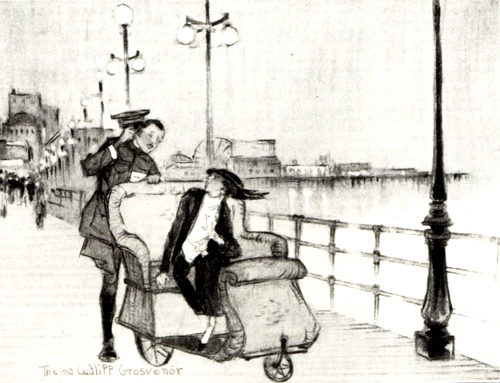
And then I done the bravest act of my life, not being really acquainted with horses, especially Atlantic City ones. I give the horse a lash, and off we went, I trying hard to give the impression of a good rider and not looking back because I dasn’t with that animal headed for the steel pier full clip. But I heard the captain’s remarks just the same.
“By jove, I’ll make you listen to me — just for that!” he says. And I heard no more, for the bird which keeps the horses come out and rescued me just before we hit the pier and I got off and started for the hotel, boiling with rage. Treated like a common chorus girl! Me, once the best-known parlor dancing act in the world, and now even more so on the motion-picture screen, and a lady or dead! I wouldn’t of looked at that guy again on a bet. I made up my mind right then and there to show him his mistake and that if my accent wasn’t as good as his my morals was better and no attempt on his part could get me to speak to him again.
Well in this state of mind I run into ma before I reached the hotel which she was hurrying to just ahead of me, and believe you me I was sure surprised because I never knew her out so early though she generally is up by seven, but with her curlpapers still on and a kimona, and that’s different from coming out in public.
“I’ve been taking my exercise!” she says before I could speak. “And I’m glad to see you do the same,” she says.
And I certainly had to hand it to her strength of mind because after being out so early and all she eat was only tea and dry toast for breakfast.
After which we stopped by the office and just before we got there I see the captain give a note to the clerk and walk away. When we asked for mail that note was the first thing the clerk handed me.
“Captain Raymond just left this for you, Miss LaTour,” he says.
I didn’t even open it.
“Kindly return it,” I says, very dignified, giving it back, and looked over my other mail. But no letter from my husband, which is always the way on a day a woman most needs one. So I went upstairs very low in my mind and sort of glad that even if Jim couldn’t think to write there was others would be glad enough to if they was let. And then I went and got Maison out of bed, which she was taking her breakfast in.
“You come down here for your health and look what you do to it!” I says, and made her go for a boardwalk, on which she held out for about half an hour and no wonder with the heels she wears, and then stopped me with a gasp.
“Dearie, you surely must be the one that put the hell in health,” she says. “For heaven’s sakes leave us sit down!”
Well we did, and in about five minutes along comes Mr. Freddy with a friend, Mr. Sternberger, and it was remarkable how quick Maison recovered her strength, with the result that we spent a quiet little morning and about fifty dollars of Mr. Sternberger’s money on shooting galleries and throwing rings and carousels and a Japanese auction and other restful seaside sports, and ended at a quiet little cafe simply done in paper roses and rubber palm trees where the drinks was only seventy-five cents per each, and I had to sit and watch them again, ma having gone off to exercise and not appearing to want rile along with her.
Well anyways I was sort of relieved over not having to eat lunch with Captain Raymond looking on, back at the hotel, and was just thinking of it when who would come into that café but the captain himself, alone except for another officer, a lieutenant with his arm in a sling, and caught sight of me the very minute he sat down.
Well of course I didn’t look over at him but I couldn’t help noticing he called a waiter and wrote a note on a piece of paper and that the waiter brought it over to me.
And Maison seen it too, and her gentleman friends the same, and did they kid me? They did! But I kept the bird which had brought the note over while I tore it in two without reading it and sent it back again that way, and believe you me that got over, because I could see Captain Raymond turn red all the way across the noisy room.
Well I thought that had settled it and spent a mournful if busy afternoon in another café where there was lots of smoke and a jazz band and dancing and Maison was really happy because she had finally got Mr. Freddy to spend a nickel and a half. But I was lower than ever in my mind thinking how much more often some soldiers seemed able to write than others.
Well after we had taken a nice walk in the fresh air nearly three blocks long, I got back to the hotel to find that Goldringer was giving a party that night beginning with dinner, and of course ma and me was booked for it and no escape because of my contract with him. And it was some party and at twelve o’clock that night I dragged my weary bones down the corridor after the second day of my rest, feeling that I would pass out any minute. A person certainly does need their strength to enjoy a American health resort.
The next morning I didn’t even attempt to get up for any Wild West exhibit. I hadn’t the pep for one thing; and the captain was another reason of course. And when I finally come downstairs and see ma eat practically nothing I let her set off right away after breakfast without me, for exercise was nothing in my life. I strolled round the lobby waiting for Maison Rosabelle according to her request and there I seen a big poster which I had noticed before, the one about the entertainment for the benefit of blind soldiers which the captain had been sitting under the first time I — he saw me, and I went over and read it, and the entertainment was to come off that very night. And while I was reading it the second time, the way a person does in a hotel lobby, up comes Captain Raymond and actually speaks right there where a scene would of proved me no lady.
“Please, Miss LaTour,” he says. “It’s so important.”
“Kindly do not force me to call for assistance,” I says, low and quiet. “You are a stranger to me.”
“But you don’t understand!” he says, flushing up red, the attractive way he had for all he was so fresh.
“Indeed I do,” I says. “I haven’t been in the theatrical world since three generations for nothing,” I says. “Kindly go away!”
“If you would only listen for five minutes I’d prove how mistaken you are!” he says. “Won’t you give me a chance?”
“No!” I says.
“By heavens, I’ll make you!” he says, half laughing. “I’ve never seen anything so absurd! Why, my dear lady — ”
Right then up come Maison in a simple little Xmas tree of a dress in green and gold and red, and I broke away and took her arm, and hurried her out through the front door, leaving the captain staring after us, and rather against Maison’s will.
“Why didn’t you introduce me, dearie?” she says. “I kinda thought you’d pick up that bird!”
“I didn’t pick him up. I turned him down!” I snapped. But Maison kidded me the whole three hours while we was in the beauty parlors getting waived and manicured.
Then we had a nice wholesome little lunch lasting only three hours and comparatively quiet and by ourselves, seeing there was only Goldringer and Ruby Roselle and Maison and Freddy and O’Flarety, our leading juvinile, who had turned up, and Mr. Sternberger and a friend of ma’s which used to be in the circus with her, and ma and myself. And all the way through I watched ma kind of anxiously, for she only toyed with a little salad and passed up everything else. I was by this time really scared she would be haggard or something, but she looked fine, and not a word of complaint out of her, only toward four o’clock she got kind of restless, and so did I, so we excused ourselves and walked to the door together.
“You needn’t come along with me, Mary Gilligan,” she says. “I want to walk real fast.”
I looked at her sort of surprised at that, but at the time the queerness didn’t really sink in. And I was so wore out I was actually glad to let her go alone, and personally myself I took one of those overgrown baby carriages or rolling chairs which I thought a healthy young person like myself would never come to, and sank into it like the poor weary soul I was, and let the coon tuck me in like a six-months-old, and off we went as fast as a snail.
Well it was pleasanter than I had thought it would be and I got kind of drowsy and dreamy and somehow I couldn’t help but think of Captain Raymond and how refined and nice he was and how my fame and beauty had captured him to the extent that it had almost made him forget to act like a gentleman, and how he persisted like a regular story-book hero. And I wondered if he would shoot himself on my account, and that threw a awful scare into me, for handsome women have a terrible responsibility in the way they treat men. And I wondered was I really doing the right thing taking such a risk by treating him so severe and not speaking and here he was in the service of his country and all and I might be wrecking his whole life from then on. And furthermore I thought how hard it is to be refined and what a lot a person has to sacrifice to it, and that the roughnecks of this world seem to have most of the fun. And that it was certainly hard to be dignified but that my whole career was built on my refinement no less than my great talent, and I must respect my own position. Ah well, uneasy lies the tooth that wears a crown, as the poet says, or something!
And by this time the coon had got tired pushing me and turning my face seaward had gone to take a rest, and I took one too and actually fell asleep.
When I woke up I was moving again, going slow in the direction of the Inlet, and I felt quite refreshed and happy, and the whole of Atlantic City appeared to feel the same, for everybody I passed smiled and seemed to be enjoying themselves. And they all seemed to smile at me in such a sweet friendly way it made my heart feel awful good. I was even quite surprised; because though of course I am used to being recognized every place I go, but still, more people than ever was doing it this afternoon. I begun to think I must be looking pretty good and that my hat, about which I had had a few doubts, was a big success after all. It really was a sort of triumphal progress, as the saying is, and I had half a mind to turn round when we passed the last pier; but the ocean looked so beautiful and pink in the sunset and going the other way it would of been in my eyes, so I just let myself be rolled on and on until we was almost to the Inlet and not a soul in sight. Then the chair stopped and was turned against the rail.
“Now I’ve got you at last!” said a unexpected voice, and round from the back came — not the coon but Captain Raymond.
“Where did you come from?” I asked, hardly able to speak.
“I have had the honor of pushing you into this secluded corner of — of the ocean!” he said, his blue eyes twinkling.
“But how — how — ” I sputtered.
“I bought off the colored man while you were sleeping,” he said, “and have been your humble servant for almost an hour!”
Can you beat it? You can’t!
“Well, of all the nerve!” I began, remembering how people had smiled; and no wonder!
“What are you going to do about it?” he asked. “Walk home this minute!” I says, struggling with the rugs. But they had a will of their own and it was on his side and I just couldn’t seem to get free of them.
“Oh I say, don’t be so absurd!” he says smilingly.
“I’m not!” I says.
“Oh, but you are!” he insisted. “Just sit still and let me show you something!”
Well, there was nothing for me but to give in or look a utter fool, and he was so attractive! And — well anyways, I waited and he brought out a letter from his overcoat pocket and it was the very one he had wrote me first and I had returned it to the hotel clerk.
“Please just open it!” he begged; and I did and nearly fainted because inside was a letter in Jim’s handwriting addressed to me and introducing Captain Charles Raymond who was with him in France, only being gassed was now home on leave and would I show him every courtesy as he had been good to my ever-loving husband Jim!
“And really and truly I wouldn’t have been so persistent, Miss LaTour,” Captain Raymond was saying as I looked up. “I had intended using it when I got to New York of course. But when they put me in charge of this entertainment for the benefit of the blind, and I discovered you were here, I was simply determined to get you to take part in it. Couldn’t you do us just one little dance? It would be such a drawing card, your name would. That was all I wanted, really!”
Believe you me I didn’t know what to think or how I felt. Did I feel flat? I did! Did I feel relieved? I did! So it wasn’t a mash at all, and for a moment I felt a lonelier war widow than ever. Then I remembered how Jim said in the note to be nice to this bird, and I could see, now that I looked at him good, that he was the sort which it is perfectly safe to be nice to. Not that he didn’t admire me, either, but that he was just as refined as me and more so, and was Jim’s pal beside. So I says yes, of course I would dance, and we talked and talked, and the sun went down, and we got to be real friends and was it good to hear about Jim, first hand? It was!
And after a while we commenced to walk back toward the hotel, pushing the chair, and the lights was all lit along the walk like fairyland, and also in the shops so they was more like showcases than ever.
And then I got the second shock of the afternoon, because at ten past six, with dinner at seven, there was ma in the Ocean Lunch eating griddle cakes, fishballs, Salsbury stake and coffee, with a little strained honey and apple pie on the side! No wonder she could diet so good! And I take it to my credit that since she did not notice me I never let on that I seen her, not then nor at dinner when she refused everything but two dill pickles!
But it wasn’t until afterward when I was in the star dressing room at the Appollo Theater, putting on my makeup for the benefit, that the real blow came. I was just about ready to go on when in rushed Goldringer, all breathless, with a cablegram in his hand.
“It’s all right about Olivette Twist!” he puffed at me. “We’ll begin making that fillum Tuesday!” And he threw the message down on my dressing table. It was signed by our London manager and it read:
“Present location of Charles Dickens uncertain but material is uncopyrighted. Shoot.”
And so immediately after the show myself and ma went back to New York to get a twenty-four-hour rest before commencing work again.
The 10 Biggest Underdogs to Win a Championship
There are a few cases in sports history where teams or individuals have walked into high pressure games as heavy underdogs, but they manage to walk out as champions. Here are ten underdogs who beat the odds and became legends.
- Holly Holm defeats Ronda Rousey (2015)

Undefeated UFC women’s bantamweight champion Ronda Rousey walked into UFC 193 a heavy favorite. In the preceding three years, Rousey easily made her way through the women’s division. Very few UFC experts or pundits gave her opponent Holly Holm a fighting chance.
Holm said she knew that Rousey was going to start the fight with a lot of aggression. In a post-game press conference she said, “I expected her to be aggressive and impose her will on me.” For Holm, the key to winning the fight was avoiding Rousey’s devastating armbar.
Early in the second round, Holm was able to land a well-placed kick to Rousey’s head. As Rousey fell to the mat, Holm began to circle the octagon with an expression of pure joy on her face. She knew she had just proven the experts wrong.
- Alexander Rossi wins the 100th Indianapolis 500 (2016)

In what was already a high-pressure day for IndyCar drivers, the 100th running of the “Greatest Spectacle in Racing” only added to their stress. In a field crowded with legendary Indianapolis 500 drivers, such as Helio Castroneves, Juan Pablo Montoya, and Tony Kanaan, Alexander Rossi was not high on the list of potential winners. When betting opened for the race, he was given 100–1 odds to win.
Thanks to a smart decision to not come in for more fuel with ten laps to go, Rossi managed to outlast his competition in a race that saw almost a quarter of the field unable to finish. The Indianapolis 500 is often a race of attrition. It’s not always the fastest car or the best driver who wins. On this day, Rossi and his team had a lot of luck on their side.
With his win, Rossi became the first rookie in 15 years to win the Indianapolis 500.
- Houston Rockets win the NBA Championship (1995)
Even though they won the NBA championship in 1994, no one expected the Houston Rockets to repeat the next year. Michael Jordan and his Chicago Bulls were the dominant force in the NBA, winning three out of the last four NBA Championships. Now that Jordan was retired (temporarily), other teams in the league saw a major opportunity to win the NBA Finals.
The biggest challenge facing the Rockets was the makeup of their roster. Aside from future basketball Hall of Famer Hakeem Olajuwon, the Rockets were comprised mostly of average level talent.
The Rockets entered the 1995 NBA playoffs as the No. 6 seed in the Western Conference. They went on to beat the top-seeded San Antonio Spurs in the conference finals, and then they swept the No. 1 seed Orlando Magic in the NBA finals.
- New York Jets Win Super Bowl III (1969)
In the first professional football championship game that was officially called the “Super Bowl,” the New York Jets entered the game as an 18-point underdog. With a betting line that had them losing by more than two touchdowns, few were expecting the Joe Namath-led Jets to put up much of a fight against Johnny Unitas and the Baltimore Colts.
Namath entered the game having thrown more season interceptions (17) than touchdowns (15). It also did not help that Namath had a well-known “playboy” reputation. His late night parties with celebrities were often the talk of the town.
Despite a Jets roster that was seen as mostly inferior to the Baltimore Colts, Namath decided to walk into the Miami Touchdown Club and make a bold prediction: “We’re gonna win the game. I guarantee it.” This declaration just days before the big game may have been the spark that led the Jets to beat the Colts 16-7.
- New York Mets Win World Series (1969)

At the start of the 1969 season, the New York Mets were given 100-1 odds to win the National League pennant. The previous year, the Mets finished in ninth place. Many fans still could not fathom the thought of the Mets putting up any kind of a fight in the National League. Little did those fans realize, the Mets had an influx of young talent and future Hall of Famers.
The 1969 Mets had one of the best pitching lineups of the season, including Nolan Ryan and Tom Seaver. Buoyed by solid hitting from Tommie Agee and Cleon Jones, the Mets would go on to win the NL East with an eight-game margin. But as they entered the World Series, the odds were still stacked against them.
The Mets would have to travel to Baltimore to face the odds-on-favorite Orioles in the World Series. To the shock of many, the Mets went on to win the World Series in only five games. The improbable season led to the team earning the nickname “The Amazing Mets.”
- New York Giants Win Super Bowl XLII (2008)
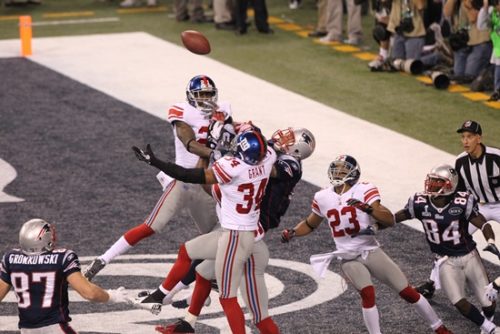
How do you defeat an undefeated team? This was the question the New York Giants had to answer when facing the New England Patriots in Super Bowl XLII. For many football fans, it seemed the destiny of Tom Brady, Bill Belichick, and their New England Patriots to finish the 2008 season with a perfect record.
While the Patriots were trying to become the first undefeated team since the 1972 Miami Dolphins, the New York Giants had a very different route to the championship game. With a 12-4 regular season record, and having not won a playoff game in seven years, the Giants entered the Super Bowl as 12-point underdogs.
New York Giants quarterback Eli Manning threw for two key touchdowns in the fourth quarter and finished the game with 255 passing yards. The real highlight of the game came with just over one minute left in the fourth quarter. The Giants needed to score a touchdown to take the lead. Manning dropped back for a pass as New England Patriots defenders pulled at his jersey, trying to wrestle him to the ground. Manning managed to escape and lobbed a 32-yard pass to receiver David Tyree, who caught the ball by wedging it between his right hand and his helmet. The “Helmet Catch” is considered one of the greatest plays in Super Bowl history. It only added to the legend of a game that saw the New York Giants go on to defeat the “undefeated” New England Patriots 17-14.
- Villanova Wins the NCAA Men’s Basketball Championship (1984)
The 1984 Georgetown Hoyas men’s basketball team included legendary coach John Thompson Jr., future basketball Hall of Famer Patrick Ewing, and a strong supporting cast of players. On the other side of the court stood the polar opposite of the Georgetown Hoyas.
Heading into the 1984 NCAA Men’s Basketball Tournament, the Villanova Wildcats had a mediocre 25-10 record. The team finished the regular season unranked and was fourth in Big East standings. Few expected the Wildcats to make it all the way to the NCAA championship game.
If Villanova wanted to beat Georgetown for the championship, they had to play a perfect game; and that is exactly what they did. That night, Villanova shot an incredible 79 percent from the floor, a percentage that has yet to be matched in a championship game.
- Chicago White Sox Win the World Series (1906)

The Chicago Cubs spent the 1906 MLB season racking up the most regular-season wins in baseball history (116), coasting to the National League pennant. Their cross-town rivals, the Chicago White Sox, spent most of that season earning the nickname “The Hitless Wonders.” The White Sox amassed the worst batting average in the American League (.230), and 23 fewer wins than the Chicago Cubs.
As both teams began the 1906 World Series, it was all but settled that the Cubs would easily rout the White Sox and win the World Series. The White Sox had different plans and managed to beat the Cubs in six games. It was a historic World Series upset. The victory was even more surprising because the “Hitless Wonders” managed to have an even worse batting average in the World Series (.198).
- Donerail Wins Kentucky Derby (1913)

The Kentucky Derby is known as the “fastest two minutes in sports.” Each year, thousands of people wager on the fastest horses in America. One of the most exciting things about the Kentucky Derby is the ability to win big on a long-shot bet.
In 1913, some very lucky people won big by betting on the 91-1 underdog horse, Donerail. Leading up to the race, Donerail was an unknown commodity who had no high profile victories on his record. After leading Donerail to victory, the jockey, Roscoe Goose, earned the nickname “Golden Goose.”
Just a $2 bet on the underdog horse would have netted you $184.90. To this day, the victory stands as the biggest upset in Kentucky Derby history.
- Buster Douglas Beats Mike Tyson (1990)

Many sports fans remember where they were in 1990 when underdog Buster Douglas knocked out Mike Tyson. It was a moment in sports that is frozen in time, and it is remembered by many as the most stunning upset in sports history.
The historic fight took place in the Tokyo Dome in Japan. Mike Tyson entered the fight undefeated (39-0) and was the WBC undisputed heavyweight champion. His opponent, James “Buster” Douglas, was considered just another contender that Tyson would easily vanquish. Douglas entered the fight with four losses and one draw.
In the ninth round, both Douglas and Tyson were tired and growing weaker by the second. Douglas suddenly landed a powerful right uppercut and a series of jabs to the head of Tyson. It was over. Tyson tried in vain to answer the official’s ten count, but Douglas’ final barrage was too much. Buster Douglas walked into the Tokyo Dome a 42-1 underdog, and he walked out a champion.
Your Weekly Checkup: Medical Device Malfunction or Degeneration
“Your Weekly Checkup” is our online column by Dr. Douglas Zipes, an internationally acclaimed cardiologist, professor, author, inventor, and authority on pacing and electrophysiology. Dr. Zipes is also a contributor to The Saturday Evening Post print magazine. Subscribe to receive thoughtful articles, new fiction, health and wellness advice, and gems from our archive.
Order Dr. Zipes’ new book, Damn the Naysayers: A Doctor’s Memoir.
Now that I’ve reached the ripe old age when I can leave my shoes on while traversing airport security screening, the TSA agent always asks before I enter the metal scanner, “Any device implants?” Thankfully, I am able to say no: all my body parts are still original.
According to a recent article, that’s not true for about 32 million Americans (1 in 10) who have at least one medical device implanted. Inserts range from simple items like eye lenses or birth control devices, to complex objects such as cardiac stents, pacemakers, defibrillators, and heart valves.
Creating an implant that can weather the body’s hostile internal environment over a long time period is a major challenge. Manufacturers must replicate the years of toxic impact the body exerts on an implant to be certain the device performs as it should, often for many decades. Even minor changes to a “tried and true” implant can sometimes be disastrous.
Hip implants are a case in point. Degeneration of the hip bone and joint from arthritis or injury can lead to pain, stiffness, and difficulty walking, often requiring total hip replacement. One type of implant is metal-on-metal in which the ball and socket of the device are both made of metal. Walking or running causes the metal components to rub against each other, eventually eroding the surfaces and causing tiny metal pieces to implant in the neighboring tissues. Some of the metal ions can enter the bloodstream to elevate cobalt, nickel, or chromium levels.
Patients often respond to these changes differently. Some experience no symptoms while others have an adverse reaction to the metal debris damaging the soft tissue surrounding the implant; they experience pain, loosening of the implant, and eventual device failure. The changes can impact general health, affecting nerves, heart, kidneys and thyroid. Some companies have recalled specific types of devices. The FDA states that, “All hip implants will need to be replaced eventually, and implant longevity is influenced by a patient’s age, sex, weight, diagnosis, activity level, condition of the surgery, and the type of implant.”
The purpose of this column is to call attention to implants that may not be functioning as optimally as they did after insertion. Patients experiencing new symptoms should not just “tough it out,” but should contact their health care professional promptly for evaluation. The problem may be trivial, requiring a minor adjustment, or significant, requiring device replacement.
If you are that patient, do not put off your checkup.
20 Life Lessons from Leonardo da Vinci

Leonardo da Vinci was a genius, one of the few people in history who indisputably deserved — or, to be more precise, earned — that appellation. Yet it is also true that he was a mere mortal.
The most obvious evidence that he was human rather than superhuman is the trail of projects he left unfinished. Among them were a horse model that archers reduced to rubble, an Adoration scene and battle mural that were abandoned, flying machines that never flew, tanks that never rolled, a river that was never diverted, and pages of brilliant treatises that piled up unpublished. “Tell me if anything was ever done,” he repeatedly scribbled in notebook after notebook. “Tell me. Tell me. Tell me if ever I did a thing. … Tell me if anything was ever made.”
Of course, the things he did finish were enough to prove his genius. The Mona Lisa alone does that, as do all of his art masterpieces and his anatomical drawings. But we can also appreciate the genius inherent in his designs left unexecuted and masterpieces left unfinished. By skirting the edge of fantasy with his flying machines and water projects and military devices, he envisioned what innovators would invent centuries later. And by refusing to churn out works that he had not perfected, he sealed his reputation as a genius rather than a master craftsman. He enjoyed the challenge of conception more than the chore of completion.
—Leonardo da Vinci
What also distinguished Leonardo’s genius was its universal nature. The world has produced other thinkers who were more profound or logical, and many who were more practical, but none who were as creative in so many different fields. Some people are geniuses in a particular arena, such as Mozart in music and Euler in math. But Leonardo’s brilliance spanned multiple disciplines, which gave him a profound feel for nature’s patterns and crosscurrents. His curiosity impelled him to become among the handful of people in history who tried to know all there was to know about everything that could be known.
The fact that Leonardo was not only a genius but also very human — quirky and obsessive and playful and easily distracted — makes him more accessible. He was not graced with the type of brilliance that is completely unfathomable to us. Instead, he was self-taught and willed his way to his genius. So even though we may never be able to match his talents, we can learn from him and try to be more like him. His life offers a wealth of lessons.
1. Be curious, relentlessly curious. “I have no special talents,” Einstein once wrote to a friend. “I am just passionately curious.” Leonardo actually did have special talents, as did Einstein, but his distinguishing and most inspiring trait was his intense curiosity. He wanted to know what causes people to yawn, how they walk on ice in Flanders, what makes the aortic valve close, how light is processed in the eye, and what that means for the perspective in a painting. Being relentlessly and randomly curious about everything around us is something that each of us can push ourselves to do, every waking hour, just as he did.
2. Seek knowledge for its own sake. Not all knowledge needs to be useful. Leonardo did not need to know how heart valves work to paint the Mona Lisa. By allowing himself to be driven by curiosity, he got to explore more horizons and see more connections than anyone else of his era.
3. Retain a childlike sense of wonder. At a certain point in life, most of us quit puzzling over everyday phenomena. We might savor the beauty of a blue sky, but we no longer bother to wonder why it is that color. Leonardo did. So did Einstein.We should be careful to never outgrow our wonder years, nor to let our children do so.
4. Observe. Leonardo’s greatest skill was his acute ability to observe things. It was the talent that empowered his curiosity, and vice versa. It was not some magical gift but a product of his own effort. When he visited the moats surrounding Sforza Castle, he looked at the four-wing dragonflies and noticed how the wing pairs alternate in motion. When he walked around town, he observed how the facial expressions of people relate to their emotions, and he discerned how light bounces off different surfaces. This, too, we can emulate. Water flowing into a bowl? Look, as he did, at exactly how the eddies swirl. Then wonder why.
5. Start with the details. In his notebook, Leonardo shared a trick for observing something carefully: Do it in steps, starting with each detail. A page of a book, he noted, cannot be absorbed in one stare; you need to go word by word. “If you wish to have a sound knowledge of the forms of objects, begin with the details of them, and do not go on to the second step until you have the first well fixed in memory.”
6. See things unseen. Leonardo’s primary activity in many of his formative years was conjuring up pageants, performances, and plays. He mixed theatrical ingenuity with fantasy. This gave him a combinatory creativity. He could see birds in flight and also angels, lions roaring and also dragons.
7. Go down rabbit holes. He filled the opening pages of one of his notebooks with 169 attempts to square a circle. In eight pages of one notebook, he recorded 730 findings about the flow of water; in another notebook, he listed 67 words that describe different types of moving water. He measured every segment of the human body, calculated their proportional relationships, and then did the same for a horse. He drilled down for the pure joy of geeking out.
8. Get distracted. The greatest rap on Leonardo was that these passionate pursuits caused him to wander off on tangents. But in fact, Leonardo’s willingness to pursue whatever shiny subject caught his eye made his mind richer and filled with more connections.

9. Respect facts. Leonardo was a forerunner of the age of observational experiments and critical thinking. When he came up with an idea, he devised an experiment to test it. And when his experience showed that a theory was flawed — such as his belief that the springs within the earth are replenished the same way as blood vessels in humans — he abandoned his theory and sought a new one. If we want to be more like Leonardo, we have to be fearless about changing our minds based on new information.
10. Procrastinate. While painting The Last Supper, Leonardo would sometimes stare at the work for an hour, finally make one small stroke, and then leave. “Men of lofty genius sometimes accomplish the most when they work least,” he explained, “for their minds are occupied with their ideas and the perfection of their conceptions, to which they afterward give form.” Most of us don’t need advice to procrastinate; we do it naturally. But procrastinating like Leonardo requires work: It involves gathering all the possible facts and ideas, and only after that allowing the collection to simmer.
11. Let the perfect be the enemy of the good. When Leonardo could not make the perspective in the Battle of Anghiari or the interaction in the Adoration of the Magi work perfectly, he abandoned them rather than produce a work that was merely good enough. He carried around masterpieces such as his Saint Anne and the Mona Lisa to the end, knowing there would always be a new stroke he could add. Likewise, Steve Jobs was such a perfectionist that he held up shipping the original Macintosh until his team could make the circuit boards inside look beautiful, even though no one would ever see them. Both he and Leonardo knew that real artists care about the beauty even of the parts unseen. Eventually, Jobs embraced a countermaxim, “Real artists ship.” That is a good rule for daily life. But there are times when it’s nice to be like Leonardo and not let go of something until it’s perfect.
12. Think visually. Leonardo was not blessed with the ability to formulate math equations or abstractions. So he had to visualize them, which he did with his studies of proportions, his rules of perspective, his method for calculating reflections from concave mirrors, and his ways of changing one shape into another of the same size. Too often, when we learn a formula or a rule — even one so simple as the method for multiplying numbers or mixing a paint color — we no longer visualize how it works. As a result, we lose our appreciation for the underlying beauty of nature’s laws.
13. Avoid silos. Leonardo had a free-range mind that merrily wandered across all the disciplines of the arts, sciences, engineering, and humanities. His knowledge of how light strikes the retina helped inform the perspective in The Last Supper, and on a page of anatomical drawings depicting the dissection of lips, he drew the smile that would reappear in the Mona Lisa. He knew that art was a science and that science was an art. Whether he was drawing a fetus in the womb or the swirls of a deluge, he blurred the distinction between the two.
14. Let your reach exceed your grasp. Imagine, as he did, how you would build a human-powered flying machine or divert a river. Even try to devise a perpetual-motion machine or square a circle using only a ruler and a compass. There are some problems we will never solve. Learn why.
15. Indulge fantasy. His turtle-like tanks? His plan for an ideal city? The man-powered mechanisms to flap a flying machine? Just as Leonardo blurred the lines between science and art, he did so between reality and fantasy. It may not have produced flying machines, but it allowed his imagination to soar.
16. Create for yourself, not just for patrons. No matter how hard the rich and powerful Marchesa Isabella d’Este begged, Leonardo would not paint her portrait. But he did begin one of a silk-merchant’s wife named Lisa. He did it because he wanted to, and he kept working on it for the rest of his life, never delivering it to the silk merchant.
17. Collaborate. Genius is often considered the purview of loners who retreat to their garrets and are struck by creative lightning. Like many myths, that of the lone genius has some truth to it. But there’s usually more to the story. The versions of Virgin of the Rocks and Madonna of the Yarnwinder and other paintings from Leonardo’s studio were created in such a collaborative manner that it is hard to tell whose hand made which strokes. And his most fun work came from collaborations on theatrical productions and evening entertainments at court. Genius starts with individual brilliance. But executing it often entails working with others.
18. Make lists. And be sure to put odd things on them. Leonardo’s to-do lists may have been the greatest testaments to pure curiosity the world has ever seen.
19. Take notes, on paper. Five hundred years later, Leonardo’s notebooks are around to astonish and inspire us. Fifty years from now, our own notebooks, if we work up the initiative to start writing them, will be around to astonish and inspire our grandchildren, unlike our tweets and Facebook posts.
20. Be open to mystery. One day Leonardo put “Describe the tongue of the woodpecker” on one of his eclectic and oddly inspiring to-do lists. The tongue of a woodpecker can extend more than three times the length of its bill. When not in use, it retracts into the skull and its cartilage-like structure continues past the jaw to wrap around the bird’s head and then curve down to its nostrils. When the bird smashes its beak repeatedly into tree bark, the force exerted on its head is 10 times what would kill a human. But its bizarre tongue and supporting structure act as a cushion, shielding the brain from shock.
There is no reason you actually need to know any of this. It is information that has no real utility for your life, just as it had none for Leonardo. But maybe you, like Leonardo, want to know. Just out of curiosity. Pure curiosity.
From Leonardo da Vinci by Walter Isaacson. Copyright © 2017 by Walter Isaacson. Rerpinted by permission of Simon & Schuster, Inc.
Walter Isaacson is a professor of history at Tulane University, a celebrated journalist and biographer, and author of the New York Times bestsellers Leonardo da Vinci; The Innovators; Steve Jobs; Einstein: His Life and Universe; Benjamin Franklin: An American Life; and Kissinger: A Biography.
This article is featured in the May/June 2018 issue of The Saturday Evening Post. Subscribe to the magazine for more art, inspiring stories, fiction, humor, and features from our archives.
Movies for the Rest of Us with Bill Newcott: Memorial Day
We pay tribute to our brave soldiers with scenes from some of the most moving films featuring our armed forces.
Healthy Weight, Healthy Mind: Stop Trying to Be a Mind Reader
We are pleased to bring you this regular column by Dr. David Creel, a licensed psychologist, certified clinical exercise physiologist and registered dietitian. He is also credentialed as a certified diabetes educator and the author of A Size That Fits: Lose Weight and Keep it off, One Thought at a Time (NorLightsPress, 2017).
Do you have a weight loss question for Dr. Creel? Email him at [email protected]. He may answer your question in a future column.
Assuming we know what other people are thinking can get us into big trouble. This fallacy of thought can fuel racism, perpetuate neighborhood feuds, lead to social anxiety, result in road rage, and contribute to disintegrating marriages. When we try to read another person’s mind we’re often wrong—but we act on those beliefs anyway. If my wife lets me oversleep because she knows I’m extra tired, I might “read her mind” and decide she let me oversleep to prove a point about my inability to set an alarm. This could lead to an argument over nothing.
The hard part about mind reading is sometimes we get it right, which reminds us to keep doing it. We remember the times we assumed correctly and tend to forget the times we guessed wrong.
Mind reading can obstruct weight management by causing anxiety and concern over what others think about us. Thinking this way can result in self-imposed pressure to prove something to a boss, sibling, spouse, or co-worker. As a result, we may eat to help relieve the stress caused by these feelings — or we may lose focus on weight-related goals.
Mind reading can directly impact health behavior if we make assumptions about what others think about our size, what we eat, or our competence using exercise equipment at the gym.
At our initial session I had asked Tara if she’d be willing to keep a food journal so we could review it a week later. As we began our second session, I asked how things had gone the previous week. Tara was polite but a bit jittery as we sat three feet apart with a round table between us. Every minute or so she pulled at the front of her shirt to prevent it from conforming to the body she’d grown to hate. She had kept a food and activity journal using an app on her phone, but it remained tucked in her purse, which was on the floor near her feet. As I began to ask specific questions about eating and exercise, she again picked at her shirt.
“I know you’re going to think this is just an excuse but we had out-of-town guests this week and I didn’t follow the plan very well.”
As I tried to reassure her that my role was to help, not judge, I asked if I could take a look at her food journal. She leaned over, picked up her large purse, and began to rifle through it.
“You must think I’m really disorganized. I know my phone is in here,” she said. Finally, she pulled out the phone and a crumpled tissue fell on the table. “I’m sorry, that’s embarrassing.”
“It’s okay, really — if I had a purse I can only imagine what might fall out of it,” I said, hoping to help her feel at ease.
She quickly stuffed the tissue back in her purse and set the phone near her body at the edge of the table. She looked down at her phone, rubbing her thumb back and forth on the screen trying to clean it.
“Before you look at this, I just want you to know that I’m not lazy and I know I shouldn’t eat this way. I’m sure all of you guys eat well and exercise — but I’m just not there yet. You probably think I’m not going to do well because I’ve already messed up and it’s only the first week of the program.”
“Tara, I honestly haven’t made any assumptions about you and how you’re going to do in the program.” I paused, hoping she would look up from her phone. When she didn’t, I gently placed my hand flat on the table only inches from her. I leaned forward and tilted my head to the side in hopes of lifting her gaze toward me. She looked up. “I’m just glad you’re here and willing to allow me to work with you on some of the things you’re struggling with. I assure you, none of our diets are perfect and nobody exercises every day for months on end,” I said, before I pulled my hand back to my side of the table. “If you don’t want me to look at your food journal right now that’s okay. We can do that some other time.”
Tara took a deep breath and then agreed to let me see the records. She logged into her app and handed me her phone. She squirmed in her chair and quickly pulled her shirt away from her body.
Tara’s anxiety was clearly related to mind reading. She made assumptions about what I believed about her, and that would interfere with treatment until I, and the rest of the team, could establish trust. I’ve worked with many people who think like Tara — people who won’t go to a gym or walk outside because they know what others will think of their size; or clients who practice tremendous restraint with eating around others because of similar fears of what people will think if they see an overweight person eating something unhealthy. Of course this restraint can’t be maintained, and when the person is alone the wheels fall off.
The fact of the matter is: We don’t know what others are thinking. To be honest, at times I don’t even know what I’m thinking myself. Things tend to jostle around in my head like a pinball machine. If I can’t tell you exactly what I’m thinking, how can someone else know what’s going on inside my head?
One way to deal with mind reading is to simply let go of assumptions. By definition, an assumption means you don’t have proof to support your belief. You are guessing. Is it really worth getting worked up over a guess? Another approach is to broaden your speculations about what others are thinking by using a variety of may statements. When we expand our guess it’s important to include opposing perspectives. If your mind reading keeps you from the gym because you believe people think you don’t belong there, you might tell yourself: “The buffed up guy may be thinking I don’t know what I’m doing, or he may be thinking way to go, or he may be thinking about the size of his biceps and have no idea I’m even around.”
9 Tips for Creative Container Gardening
Anyone can have room to grow with some inventive garden planning. Lay the groundwork for your own personal Eden by planting a vibrant, luscious landscape in pots and boxes. Container gardening is ideal for urban spaces and renters, and the right potted plants can elevate any backyard patio or pond.
1. Plant Thrillers, Fillers, and Spillers

For a dramatic display of blooms and foliage that guides the eye, follow the foolproof method of thriller, filler, and spiller. The thriller is the centerpiece, a tall plant like spikes or grasses, placed in the center or back of the container. The filler is one or more types of medium-height flora planted around it. And the spiller is an ivy or vine that will drape over the front like a waterfall of greenery.
Thrillers: Salvia, Asters, Canna lily
Fillers: Begonias, Geraniums, Coleus
Spillers: Alyssum, Nasturtium, Sweet potato vine
2. Let Your Succulents Soak Up the Sun

The desert plants that have fallen into favor in recent years love sunlight and occasional watering. When you do water your agaves and echeverias, though, drench them well. Most succulents thrive in terra cotta pots (with drainage holes) in soil that has plenty of sand and gravel mixed in. Put them in a spot with at least six hours of sun each day to see some kaleidoscopic blooms.
3. Put Together a Shade-Loving Planter

Maybe you aren’t blessed with a bright, sunny yard or balcony. That doesn’t mean you have to forego the flora. Fill a few pots with hostas, coleus, caladium, begonias, and heucherella for a cool and elegant focal point under an old oak.
4. Make a Vertical Herb Garden

An old wood pallet becomes a rustic vertical planter after stapling some landscaping fabric to the inside to create beds for your basil, rosemary, and mint. This is an excellent space-saver, but beware of using found pallets for your crafting needs, since you can’t be certain of where they’ve been. Check here for ways to properly clean salvaged material.
5. Go Big

Who said flower pots were only for annuals? Try a citrus tree or rhododendron in a large container for the illusion of a permanent garden installment. Look for dwarf varieties of shrubs like hydrangeas, lilacs, and roses to have a garden favorite you can take with you when you move.
6. Go Bog

The always-wet peat and sand mixture of a homemade bog attracts frogs, bees, and dragonflies to your miniature swamp. Ferns, irises, lilies, and some grasses grow well in bogs, but the main event is often carnivorous plants. Venus fly traps, sundews, and pitcher plants trap and consume bugs, making for a fun educational experience and some natural pest control.
7. Display Your Veggies

Many vegetable gardeners are all about raised beds. They’re easy to build, accessible, and allow for more control of the soil composition. Even if you’re not keen on a construction project, you can still grow your own food by incorporating edibles into your potted arrangements. Colorful chard, kale, lettuces, and cabbage fit right in with flowers, and — while you’re at it — cultivate some tasty blooms like nasturtium, sage, and borage flowers.
8. Practice Patience with a Bonsai

The Japanese art of growing trees in trays is involved and tedious, but for skilled gardeners a tabletop juniper or cherry blossom tree is the ultimate conversation piece. Virtually any arboreal specimen can be rooted and pruned into a bonsai tree, but many large garden stores carry favorite varieties like Japanese maple, bougainvillea, and cypress.
9. Repurpose Everyday Items for a Unique Effect


Calling all upcyclers and antique thrifters! Integrate some rustic charm into your garden by making one-of-a-kind planters out of anything that strikes your fancy: wheelbarrows, boots, bathtubs, and anything else you can find at a flea market or the family shed (the older the better). Mid-century artifacts add dynamic character to your living landscape.
News of the Week: Killer Bees, Four Freedoms, and People Try to Name a Book (Any Book at All)
The Sting of Spring
Mother Nature and assorted meteorologists have been toying with us this spring, throwing in 49-degree days along with the 70-degree ones. But we’ve turned a corner. The warm weather is here. There’s no turning back now.
I killed a giant bee in my apartment recently. The first appearance of an insect in the spring is always a bit disorienting. I heard the buzzing sound, but it was so loud I thought it was coming from construction equipment down the street. Then I saw it fly by my television and flap around the window. At first I didn’t know what to attack it with. A shoe would have been cumbersome in the window, and I didn’t want to use my copy of The Saturday Evening Post. So I used the next most logical thing: the 1951 Loretta Young film noir Cause for Alarm! Hey, I panicked and didn’t want the bee to get away! For some reason I own two copies of it and decided to sacrifice one to squash the bee (in my defense, it is considered a B-movie).
I’m usually a curmudgeon when it comes to warm weather. I start complaining about the temperatures on Memorial Day and I don’t stop until after Labor Day. But this year, I’ve decided to embrace it. I’ll wear shorts and drink cold drinks and watch tennis until the better weather comes along. If you can’t beat ’em, join ’em. Just make sure you have plenty of extra DVDs on hand to kill the bugs.
Want, Worship, Speech, Fear
Starting today, the New York Historical Society will host an exhibition of Norman Rockwell’s Four Freedoms paintings, in a celebration of Rockwell, Franklin D. Roosevelt, and America. The “Rockwell, Roosevelt & the Four Freedoms” exhibition will last until September 2 and will then go on tour to several other locations around the world, including The Henry Ford in Dearborn, Michigan, The Textile Museum in Washington, D.C., the Mémorial de Caen in Normandy, France, and the Norman Rockwell Museum in Stockbridge, Massachusetts.
To celebrate the tour, Turner Classic Movies had a marathon of movies inspired by Four Freedoms this week, hosted by Ben Mankiewicz. It included an interview with Harvey J. Kaye, author of The Fight for the Four Freedoms: What Made FDR and the Greatest Generation Truly Great. The films Mankiewicz and Kaye discussed included The Grapes of Wrath, Casablanca, Deadline U.S.A., and two short films from 1945: The Cummington Story and The House I Live In, with Frank Sinatra.
Guitar Hero
A guitar that Bob Dylan played on his first electric tour — and later strummed by Robbie Robertson — sold at auction this week for $490,000.
It should be noted, however, that this isn’t the guitar Dylan played at the 1965 Newport Folk Festival, the one that caused an uproar because some fans just couldn’t believe he had gone electric. That concert is one of the many topics in this 1968 Post profile of Dylan by Alfred Aronowitz.
Shirley
I love going through the Post archives to see who wrote for the magazine over the years. It’s an impressive list, and it includes Shirley Jackson, probably best known for her short story that’s taught in every high school English class, “The Lottery.” In the March 27, 1965, issue we published Jackson’s short story “The Bus.” She died just five months later.
This week it was announced that the Mad Men and Handmaid’s Tale star Elisabeth Moss will play Jackson in a new movie based on Susan Scarf Merrell’s novel Shirley. It’s about a couple who move in with Jackson and her husband and wish they hadn’t.
Can You Name a Book?
Speaking of books, can you name one? If someone stopped you on the street and asked you to name a book — any book at all — could you do it? Of course you could! But these people interviewed on Jimmy Kimmel Live! had a lot more trouble.
RIP Philip Roth, Joseph Campanella, Clint Walker, Richard Goodwin, Robert Indiana, Jimmy Nickerson, and Patricia Morison
Philip Roth was one of the great writers of the 20th century, known for such novels as American Pastoral, Portnoy’s Complaint, Goodbye, Columbus, and many others. He died Tuesday at the age of 85.
Here’s a funny remembrance of meeting Roth from Billions creator Brian Koppelman.
Joseph Campanella was a veteran actor who appeared in dozens of TV shows and movies. He died last week at the age of 92.
Clint Walker starred in the popular western series Cheyenne from 1955 to 1962 and appeared in many other shows and movies. He died Monday at the age of 90.
Richard Goodwin was a speechwriter and adviser to Presidents John F. Kennedy and Lyndon Johnson. He also wrote several books and was married to historian and author Doris Kearns Goodwin. He was a member of the House subcommittee that investigated rigged game shows in the late ’50s and was portrayed by Rob Morrow in the 1994 movie Quiz Show. He died Sunday at the age of 86.
Robert Indiana was an artist probably best known for his “LOVE” series of images in the 1960s. He died Saturday at the age of 89.
Jimmy Nickerson was a stuntman and actor who appeared in tons of classic movies and TV shows. He died earlier this month at the age of 68.
Patricia Morison was the original star of the Cole Porter musical Kiss Me, Kate in 1948 and went on to appear in many other stage productions and movies, including The Song of Bernadette, Song of the Thin Man, and the last Basil Rathbone Sherlock Holmes film, Dressed to Kill. She even appeared in an episode of Cheers. Morison died Sunday at the age of 103.
Quote of the Week
Not really a quote, it’s a headline, but it’s important news:
This Hawaii volcano sounds incredible. Via https://t.co/fVUSBNywwF pic.twitter.com/vxAQiRZNHx
— Tom Chivers (@TomChivers) May 18, 2018
This Week in History
Charles Lindbergh Takes Off (May 20, 1927)
Two months after the aviator made the first solo flight across the Atlantic, the Post honored Lindbergh with this Norman Rockwell cover.
Johnny Carson’s Last Tonight Show (May 22, 1992)
Carson was host of the NBC late night show for 30 years. Jay Leno took over the following Monday and didn’t thank Carson at all, a decision he called the biggest mistake of his career.
This Week in Saturday Evening Post History: First Norman Rockwell Cover (May 20, 1916)
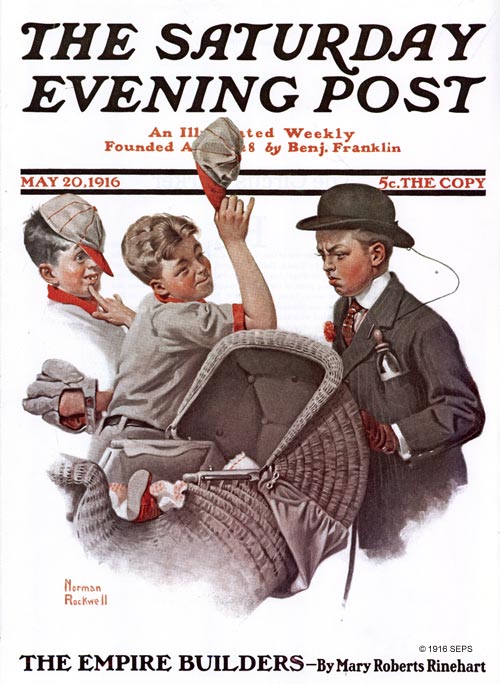
By: Norman Rockwell
May 20, 1916
Rockwell’s first cover was titled Boy with Baby Carriage. He also did the first full-color cover for the Post, The Old Sign Painter, in 1926.
French Food

The French Open tennis tournament starts Monday. There’s a big controversy this year because Serena Williams won’t be seeded due to the time she took off to have a baby. She was ranked number one when she left the tour and now she’s ranked 453, which means she’ll have to play the top players earlier. I think the moral to this story is “kids ruin everything.”
But let’s talk about French food. Here’s a classic recipe for Coq Au Vin from Bon Appétit and one for French Onion Soup Au Gratin. And because you can never have enough recipes with “au” in the name, here’s a recipe for Potatoes Au Gratin.
You can eat while watching the French Open coverage on NBC and the Tennis Channel, even if you will have to do it in the morning because of the time zone difference. But maybe it’s time Coq Au Vin became a breakfast staple.
Next Week’s Holidays and Events
Memorial Day (May 28)
Here’s Pamela Krol on what the day means and why it’s important to always remember.
Scripps National Spelling Bee (May 29)
You can watch all the preliminaries on ESPN3 starting at 9:15 a.m. and then the finals May 31 on ESPN2 starting at 10 a.m.
Last year’s winning word was marocain, which is a word I’ll probably never use, but it is an anagram of macaroni.
Little Green Men
It was the winter of the Desert Storm trading cards, and most of the kids on my block had already caught the patriotic fever that came hand in hand with smart bombs, brown camouflage pants, and posters of A-10 Warthogs. I’m sure wars have had trading cards before, but it wasn’t every day you could trade a Ricky Henderson or an Ozzie Guillen for a General Schwarzkopf or a Carpet Bombing. In a way, rooting for the Army was like being invested in a local sports team, except it wasn’t one that lost all the time, like the Indians or the Cavs or the Browns. In retrospect, that was probably the reason why jingoistic fervor and basement militaria were so exceedingly common in our particular corner of the Midwest.
Despite a pacifistic upbringing, I had to admit that there was something strangely appealing about the artifacts of war; the guns and bayonets and shrapnel-torn helmets. Of course, there was nothing of the sort in my house, save for shelves of history books, so it felt even more seductively verboten. It wasn’t strange to find yourself in a friend’s wood-paneled basement, suddenly beholding an AK-47 or a dud grenade or a cabinet of Hitler Youth knives.
My best friend and next-door neighbor Scottie Barber didn’t have any war paraphernalia in his home either, but we both harbored an obsession with warplanes and military history, particularly in regard to the Second World War. On Saturday afternoons, Scottie and I would often play with legions of toy soldiers made from cheap-smelling plastic. He had a box of his own, and I’d lug mine over, too — together, we made a tidy little army. By virtue of what we had, the two sides of the conflict were little green men meant to represent the United States in the Second World War, and little gray men meant to represent Germany in the First World War. We always pretended they were actually Nazis, but the spiked Pickelhaube helmets were unmistakable. It confuses me to this day why forces of the toy Kaiser were so easily obtainable in Midwestern dollar stores in the early 1990s, but some mysteries are probably best left unsolved.
Most of the play was dedicated to an extremely elaborate set-up period, whereupon Scottie’s bedroom was slowly transformed into a battlefield with each little man positioned meticulously along the frontlines. There were men with bazookas, flamethrowers, and sub-machine guns. There were officers packing pistols and men with grenades, frozen mid-hurl. There were men with Browning machine guns, men loading mortars, and men crawling on their bellies. And of course there were the least attractive figures (those without weapons, I mean), like the minesweepers, the men with binoculars, and the radio operators. There was an astounding prevalence of these figures, just as there are always way too many green and yellow jelly beans.
Some kids would play with their men outside (ideally in a sandbox, so as to disguise their unsightly plastic bases), but Scottie and I always kept our soldiering indoors, even in the summer. This was because of our neighbor, Mr. Kostakopoulos, who had lived under the Nazi occupation in Greece and had seen many terrible things. He became incredibly agitated whenever anyone made light of war, and especially toward children who played at it. It was rumored that he had once destroyed a television set because it was showing an episode of Hogan’s Heroes. We shuddered to think of what he might do, as a matter of principle, to a pack of Desert Storm trading cards.
Mr. Kostakopoulos generally kept to himself, but the consensus was that he was deranged and probably dangerous, so the neighborhood kids were told by their parents to avoid him at all costs. Of course, an exception was made at Halloween, so that the parents of trick-or-treaters could partake in his delicious homemade baklava.
As it turned out, the preparations for our wars were always more entertaining than actually fighting them. By the time everything was set up, the afternoon was half gone. We’d shoot a few rubber bands back and forth, trying to knock over the enemy men, but then we’d lose steam, pretend an air strike had been called in, and obliterate the Nazis like the men wearing the rubber costumes in a Godzilla movie.
On this particular Saturday, we leaned back in beanbag chairs, surveying the carnage and sipping from orange-flavored Little Hugs. A Little Hug was a kind of sugar water encased in a plastic, barrel-shaped mold. The barrel’s lid was made from tin foil, and the idea was to puncture it with a straw. Instead, we punctured them with our front teeth and marveled at the result, which resembled the handiwork of buck-toothed vampires.
“How many gees do you think you could take before blacking out?” asked Scottie, apropos of nothing. “Gees” referred to g-force, the heightened power of gravity endured by fighter jet pilots as they execute difficult maneuvers.
“I don’t know,” I said. “Maybe five or six.”
“I know I could take nine, maybe ten,” bragged Scottie, knowing full well that even seasoned fighter pilots had been known to black out at seven. There was a friendly one-upmanship at play during most, if not all, of our interactions.
“Oh jeez, I forgot to tell you …” Scottie said.
“What?” I asked.
“You’re not gonna believe this, it’s so gross.”
“What!”
“I saw the grossest picture in a World War II book.”
“What was it?” I asked, intrigued. We understood that war was horrific on some level, but like most children who had never actually experienced one, we were short-sighted and fascinated by morbidity.
“It was a Japanese soldier on Tarawa. The Marines were clearing out the bunkers with flamethrowers, and they barbequed him.”
“What did it look like?”
“He was mostly a skeleton, ’cause he’d been burned completely, but his helmet was still on. It was like the skeleton was alive.”
Some weeks later, Scottie showed me this picture, buried inside a thick volume on the island-hopping campaigns of ’43 and ’44. It was horrible, just as Scottie had described. A detail he had omitted was that a few random patches of flesh remained attached to the skull, lending it a freakishly lifelike appearance. When you’re 7 years old and you see something like that, it makes an impression. I can still see his charred skull in my mind’s eye.
“I’ve seen worse than that,” I said, wanting to raise the stakes.
“Like what,” said Scottie.
“I’ve seen dead kids, in piles. From the Holocaust.”
“That’s nothing, I’ve seen that.”
“It wasn’t a picture,” I lied, “it was a movie of them getting killed.”
“No way,” said Scottie. “That’s impossible.” Scottie was right. He knew that my parents would never allow me to see such a film.
“Uh … it was a flip book.”
“A Holocaust flip book?”
“Yeah.”
“You’re lying.”
“It wasn’t just a flip book, it was a regular book with little flip book pictures in the corners of the pages.”
“Then show me, next time we’re at the library.”
“Okay,” I said, hoping he’d forget.
“I won’t forget.”
“Neither will I,” I said, forcing a smile. Why am I such an idiot? I wondered.
Later that day, we were in Scottie’s dining room, dive bombing some little gray men with a plastic model of a P-47 Thunderbolt. The P-47 was our favorite warplane of the moment: We admired its versatility, its toughness, and its simple, robust aesthetic. I imagine that when people encounter warplanes in real life, they tend not to spend so much time admiring their beauty. Thankfully, Scottie and I had the benefit of not being bombarded with metal and chemicals from a great height.
“I wonder if America’s the only country that never lost a war,” Scottie wondered.
“There might be others,” I said. “But I can’t think of any.”
“Well, let’s go through the major powers. England lost to us in the Revolution, France lost to the Nazis …”
“Russia lost to the Japanese, the Japanese lost to us,” I continued. “What about China?”
“China lost to the Japanese before we beat them.”
“I guess that’s true,” I said.
“Then we beat Mexico, Spain, the Indians …”
“What about Canada?”
“Canada lost in the French and Indian war.”
“But was it ‘Canada’ then?”
“Sure it was.”
“What about the countries that stay out of war, like Switzerland?”
“They don’t count. You have to play to win.”
“Then maybe you’re right,” I said.
We were interrupted by an outburst of laughter from the living room. It was Mr. Barber, who was lounging in an armchair and watching the Cavaliers lose. Mr. Barber was a veteran of Vietnam, but I’d never heard him talk about it.
“What’s so funny, Dad?” asked Scottie.
“You kids are. ‘We never lost a war,’ who told you that?”
“Books,” said Scottie.
“Well, the books were wrong. We lost Vietnam.”
“But way more of them died than us,” Scottie reasoned.
“Civilians, maybe,” said Mr. Barber, and left it at that.
“Vietnam was more of a tie, then,” Scottie said. I think he was attempting to salvage some of his father’s honor. Nobody wanted a dad who was on the losing side.
“Korea was a tie,” Mr. Barber explained. “Vietnam was in the loss column. A solid L.” He took a sip from his can of Rolling Rock.
“But if the Viet Cong won, how come they … well, anyway, they didn’t have much of a country left after.”
“Nobody really wins a war …” explained Mr. Barber, without taking his eyes off of the game. “There’s only different degrees of losing. So maybe we lost less, but we still lost. Aw, come on, Hot Rod, you can at least try to make your free throws.”
“We had B-52s, though,” Scottie moaned. “That’s the best non-stealth bomber in history.”
“Yeah,” I said. “They’ve been in service over thirty years. There’s some flying in Desert Storm, right now.”
“This is so stupid,” said Mr. Barber, gesturing at the television. “How do you miss that shot? He was in the paint for Christ’s sake! If Lenny doesn’t put Price back in there, I’m gonna … Christ …” He trailed off, taking another sip of beer.
“We won the Cold War, though,” muttered Scottie. “That was one I forgot. Even with a loss, we’re still batting, like .900, .950. Nobody can beat that.”
“Yeah, that’s pretty good,” I said.
“Losing to the Bucks, to the damn Bucks …” Mr. Barber melodramatically lowered his chin to his chest. “Hey, Scottie, you mind grabbing your old man another beer?”
“Sure, Dad,” said Scottie, and he left the room.
I sat there for a minute, lost in my own world. Evening light streamed into the living room from between the curtains, and I held the P-47 aloft, turning it until the sun glittered across the fuselage, just the way I wanted it to. The game continued, ambiently, in the background. The players ran back and forth and forth and back.
Frozen and Gelatinous Wonders from the 1950s Fridge
Marvelous salmon salad, jellied consommé, soda fountain fare, and more recipes for fans of midcentury cookery:
—
So Cool and Refreshing
Originally published in The Country Gentleman, July 1, 1953
Here are 10 good ways to beat the heat — tempting salads, drinks, and desserts, all frosty cold from your freezer or refrigerator.
Jellied Consommé or Madrilène

It’s the ideal way to begin supper on a hot summer day. And what could be easier to prepare! Just chill the canned consommé or madrilène in the refrigerator for at least four hours until firm. Open cans and serve, cold and shimmery, in chilled bowls or cups. We’ve garnished the soup with slices of avocado for color accent. Lemon wedges bring out the flavor. For an extra illusion of frostiness, it’s fun to serve your jellied soups in crystal bowls surrounded by lots of crushed ice.
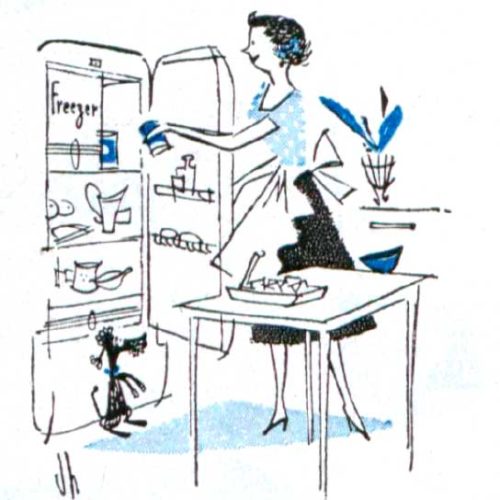
Chocolate Sundae Cups

The idea for this good party dessert came from Mrs. Glenn Lesan of Mount Ayr, Iowa. To make chocolate cups, melt one 6-ounce package of semisweet chocolate pieces and 3 tablespoons of butter in the top of a double boiler over hot water, stirring until smooth. Remove from heat and stir until of a good spreading consistency. Swirl the chocolate mixture on the inside of paper baking cups. Place the chocolate-lined cups in cold muffin tins and chill. To serve, remove paper and fill with your favorite flavor of ice cream. Makes 6 sundae cups.
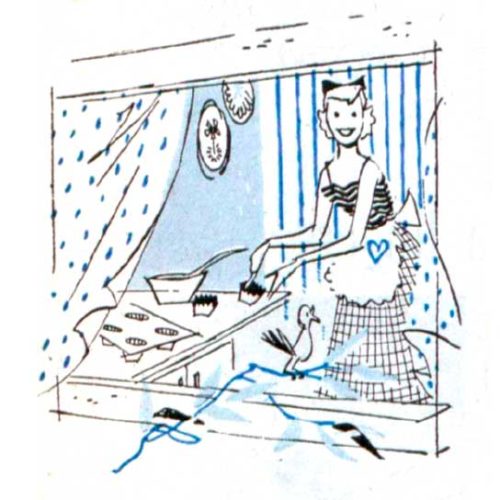
Orange Sherbet Punch

Try this creamy cold punch on a hot afternoon and see how truly refreshing it is. If you don’t have a punch bowl, serve the punch in a soup tureen, one of your pretty mixing bowls, or even a large flower bowl.
Combine 3 cups of canned grapefruit juice and 1/4 cup of lemon juice in the bowl. Add 1 quart of orange sherbet by scoopfuls. Then pour 2 quarts of ginger ale over the juices and sherbet. Stir lightly and serve. Makes 4 quarts.
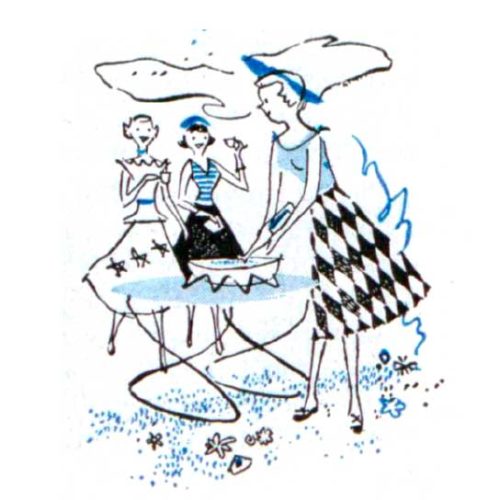
Banana-Marshmallow Cream

Use your prettiest mold for this luscious, rich refrigerator dessert. Melt 1/2 pound of marshmallows in 1/2 cup of light cream over boiling water. Stir occasionally until smooth. Combine 1/2 cup of chopped nut meats, 1/4 cup of lemon juice, 2 teaspoons of grated lemon rind, and 1 cup of finely diced bananas (2 small bananas). Add to the marshmallow mixture and cool. Beat 1 1/2 cups of heavy cream until stiff. Fold into the cooled banana mixture. Pour into a 1 1/2-quart greased mold and chill until firm. Makes 8 servings.
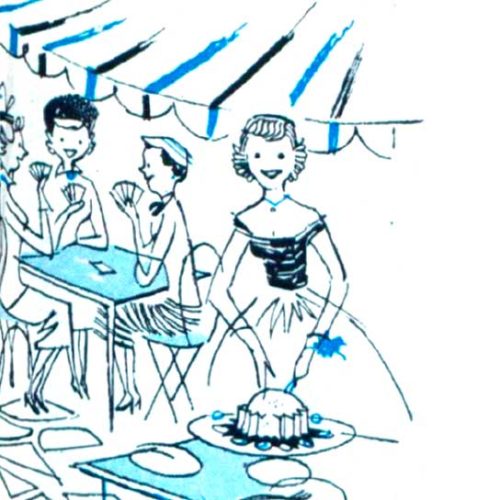
Marvelous Salmon Salad

Drain a 1-pound can of salmon, saving the liquid. Remove skin and bones. Soften 1 envelope of unflavored gelatin in 1/4 cup of cold water. Add enough water to salmon liquid to make 3/4 cup of liquid, and add to salmon. Bring to a boil and add softened gelatin, stirring until dissolved. Combine with 1/4 cup of lemon juice, 1/2 cup of mayonnaise, 3 tablespoons of pickle relish, 1/2 cup of chopped cucumber, 3/4 cup of chopped celery, 2 tablespoons of chopped onion, 1/2 teaspoon of curry powder, 1 teaspoon of salt, and 1/4 teaspoon of pepper. Fill a 1-quart mold. Chill until firm. Serves 8.
Frosted Honeydew Salad

This one is impressive enough for a party, and takes only minutes to prepare. Pare a honeydew melon, cut a slice from one end, and remove seeds. Dissolve 1 package of raspberry gelatin in 1 1/2 cups of hot water. Chill until partly thick; then mix with 2 cups of raspberries. Fill melon and chill until firm. Whip an 8-ounce package of cream cheese with 1 tablespoon of cream until fluffy. Frost outside of melon. Slice and serve.
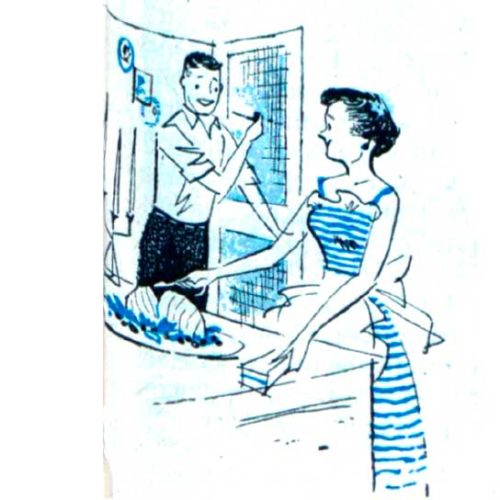
Tomato Aspic Mold

This pretty salad is made from a new product, canned tomato aspic, that holds its shape at room temperature (a big help during warm weather). The aspic can be served right from the can, or it can be melted down and combined with other seasonings or foods — hard-cooked eggs, chicken, tuna, celery — and then regelled in just a few minutes into any shape mold.
We’ve arranged halves of hard-cooked eggs in the bottom of an oiled star-shaped mold, then poured the melted aspic over the eggs, and allowed the aspic to become firm.
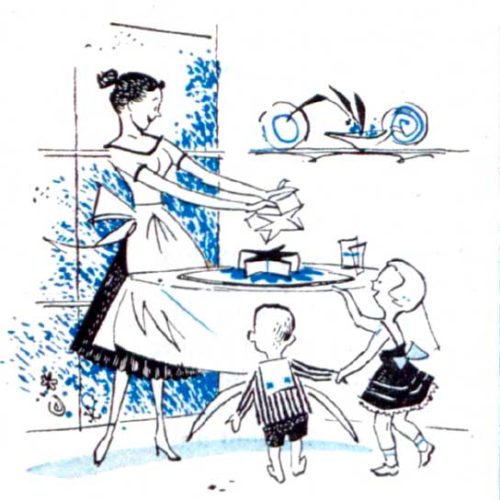
Soda Fountain Fare

To make “Tahiti Turnbuckle,” mash half a banana and a scoop of vanilla ice cream together in a tall glass. Stir in 1/3 cup of pineapple juice. Add 2 more scoops of ice cream, then fill with ginger ale.
To make “Cocajav,” mash a scoop of chocolate ice cream in 1/2 cup of strong coffee. Add another scoop of ice cream, then fill with cola.
To make “Green Destroyer,” bruise mint in glass. Add 2 scoops of vanilla ice cream and 2 tablespoons of lime juice. Fill with lemon-lime carbonated beverage.
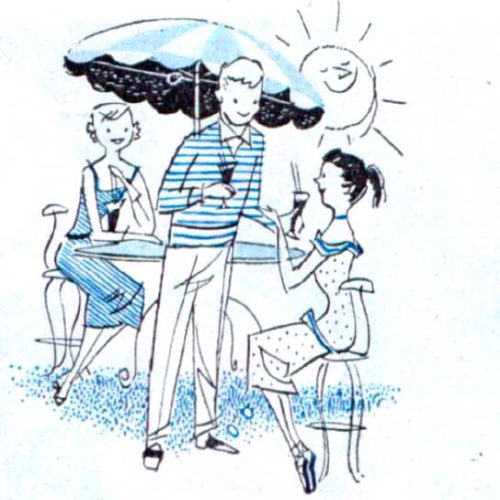
Dutch Potato Salad and Cold Cuts

A perfect combination for the Fourth of July: To make salad, cut 2 pounds of potatoes, cooked and drained, into cubes. Fry1/2 pound of diced bacon until brown. Add 2 medium onions, sliced, and 1/4 cup of chopped green pepper, and fry until onions are golden. Combine 1/4 cup each of vinegar and water, 1 tablespoon each of flour and sugar, 2 teaspoons of salt, 1/2 teaspoon each of celery seed and caraway seed, and 1/8 teaspoon of pepper. Add to bacon mixture and cook until thickened. Pour over potatoes and mix lightly. Serves 6.
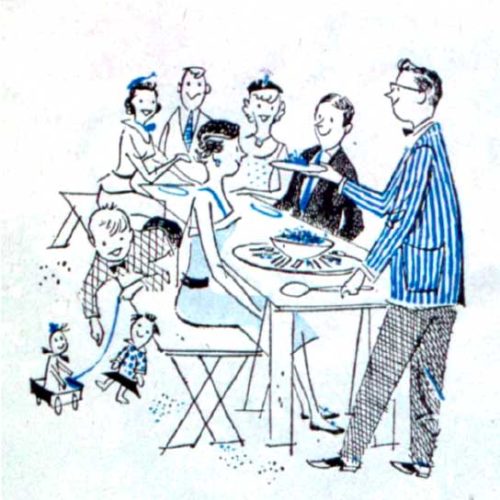
Tropical Freeze
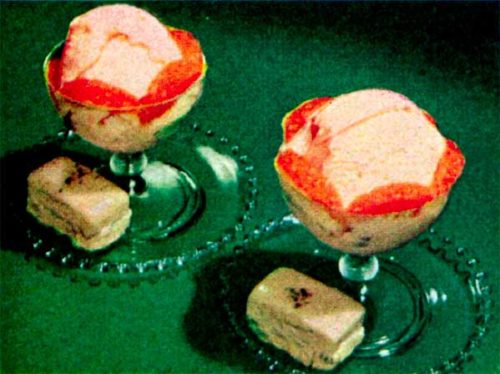
This is one of the most delightful frozen desserts we’ve ever published, and it can be made in just a matter of minutes. Combine 3/4 cup of orange juice, 1/4 cup of lemon juice, 1/2 cup of pineapple juice, 1 teaspoon of grated orange rind, and 1 cup of sugar. Whip 1 cup of whipping cream until stiff. Fold juice mixture into whipped cream. Pour into a freezer tray and freeze, stirring once when half frozen. Serve in sherbet dishes, garnished with sliced orange. Makes 1 quart.
